So, over the course of June and July, with long breaks to research and write an article on learner autonomy through note management that will be published in September, I read J. Michael Cole's Black Island: Two Years of Activism in Taiwan. This came right on the heels of Officially Unofficial, which I appreciated for its perspectives on Taiwanese society and politics that I had also witnessed in the past ten years here.
All in all, I liked Black Island more than Officially Unofficial - first of all, it was free of the ridiculously irritating "using the third person to talk about oneself" narrative employed by its predecessor. It focused more on events in recent Taiwanese history rather than the author himself, which was a boon because, although I have nothing against J. Michael Cole, I am more interested in Taiwanese political history and current affairs than I am the personal history of a journalist I happen to have read. Being lightly annotated republishings of previous work, the present tense (employed because that's what those stories used for obvious reasons) gave the narrative a sense of urgency and contemporariness rather than feeling like "history" (and, in fact, the events documented didn't happen that long ago). The present-tense tone gives one the feeling, while reading, that these events are happening as you are reading it - it makes you want to go to Dapu and protest, rail against the destruction of the Huaguang Community or surround the Legislative Yuan yet again. Then you remember, no, this is all a few years in the past. It's 2016 now, Taiwanese society has processed these ideas and is looking to the future. You, the reader, must do the same. The interesting question that Black Island leaves open - as it must - is what happens next.
Like Officially Unofficial, Black Island was a good chance to go back and review my memories of the past few years of Taiwanese politics, and pick up on threads, ideas and smaller events I'd missed. Having, as I mentioned before, been more concerned with completing my teaching degree than being fully invested and informed of Taiwanese affairs, there are things I missed. I was more intellectually present during the actual Sunflower occupation - but I think that electrified and reawakened quite a few people; I'm not unique in that regard. I hadn't had a Delta course going on at that particular time, and I actually spent a great deal of time outside the Legislative Yuan, including heading down after work and staying until the MRT was about to close for several evenings in a row. I wasn't there to report on events, however - I was there to support the students. I enjoyed going back and reading (in some cases for the second time) actual reporting on the events of those weeks.
For someone who had already read a lot of the work published in Black Island (I experienced a distinct sense of deja vu several times not only because I had been in Taiwan when those events took place but because I had in fact already read that exact same article two to four years ago), it is a fairly strong compliment to say that it held my interest upon re-reading.
Finally, this is neither a point in favor of or against the book but, as it triggers interesting thought, I think it fits in the "good" section: Cole's work mentions more than once the idea of civic nationalism over ethnic nationalism beginning to take root in Taiwan. It can hardly do differently, not only because there are "ethnic" (if the entire concept of ethnicity means anything, and depending on where you draw the lines) differences in Taiwan itself, between waishengren and Hoklo, "Chinese" and aborigine as well as Southeast Asian immigrant, that must be overcome to realize the idea of Taiwan as a nation, but also because as much as many won't admit it, Taiwan is very ethnically similar to China (again, if ethnicity means anything at all). To differentiate itself from China Taiwan simply cannot turn to an ethnic base for their desire for self-determination as an independent nation. It must turn to a civic one; there is no other reasonable path...
...but this is not the main reason why I find discussion of that concept interesting. Instead, I am invested in it primarily as an immigrant in Taiwan. I call myself an immigrant because, while I am not a citizen and retain something of an American identity, if I had a reasonable chance at citizenship (the double standard of being forced to give up one's original citizenship to attain Taiwanese nationality, while Taiwanese are under no such edict, is simply neither reasonable nor acceptable) I would be highly likely to seek it, and because I have no real plans to return to the USA. It is true that we may leave someday for professional reasons or because we face difficulties as non-citizens, but it is unlikely that the country we'd leave for would be the one we come from.
If Taiwanese identity is one of civic rather than ethnic identity, and therefore anyone who buys into, contributes to and participates in that identity can be "Taiwanese" even if they can never be ethnically Chinese, then the next logical step is to relax immigration and naturalization laws. This affects me directly, for reasons stated above. It has the potential to change on a fundamental level how I relate myself and my past to Taiwan and life in it. To legitimize, to some extent, the contributions I want to make and the participation I would like to offer. To see Taiwan as a home that genuinely wants people like me here and feels we help rather than hinder the nation's progress.
Right now I have to admit that while I feel welcome here, it is not uncommon for events in my life to give me the feeling that Taiwan wants me to come and teach their people English and wants to give me very little in return, and certainly doesn't want me to assimilate or stay permanently or have a say in political goings-on that do affect my life. A "nation of ethnic Taiwanese" is not likely to see people like me differently. A Taiwan that values civic over ethnic nationalism, however, is one that might.
This is, again, why I am disappointed that the party of young activists, who seemed to be the most likely to welcome immigrants like me, instead want to keep us on the fringes. Yes, I will say it again and I will ever, ever, ever, ever shut up about it until things change. They are the direct results of the events described in Black Island, and so far they have not been great allies to the logical conclusion of civic vs. ethnic nationalism.
Anyway. There are some things I didn't like about Black Island, but I'd say they are considerably fewer and markedly less annoying than in Officially Unofficial.
The first is that, as this is a collection of previously published journalism, as is often the case when one journalist covers related or ongoing events, there is quite a bit of repetition. Editing some of that out would have made for a stronger narrative.
My husband pointed out, and I agree, that the little interlude of pieces focusing on the fight for marriage equality felt a bit jarring in its discontinuity. I would have rather seen either the book divided not only chronologically but also by events. What I ended up doing was skipping the middle section at first, reading straight through the student activist/Sunflower narrative, and then going back and reading about marriage equality and the outsize influence of churches with evangelical ties in Taiwan. It made for a much cleaner narrative.
I would have also liked even more detail on the actual Sunflower occupation, but I suppose I can read a history textbook for that. A bit of a deeper look into the Next Media acquisition would have also been of interest to me.
Brendan also noted that if you are looking for stories about other events of that time - such as the tussle between Ma Ying-jiu and Wang Jin-ping for power within the KMT, you won't find it here. I understand why, but I actually think the story would have been strengthened by including such seemingly unrelated events. In fact, as the Sunflowers and a few political commentators understood at the time and as most people understand now, Ma Ying-jiu having both KMT chairmanship and the presidency, and using that double-barreled power to not only twist arms to get the Legislative Yuan to rubber-stamp his increasingly autocratic-seeming demands, but for the president to try to fire the speaker of an entirely separate branch of government because he wasn't falling sufficiently in line was nothing short of a constitutional crisis.
If you think this attempted ouster of Wang and the power grab that represented was not done in part with forcing passage of the CSSTA, without proper review, in mind, perhaps you are not paying attention. I wouldn't say CSSTA was the only goal of that attempted consolidation of authority, but it was certainly one of them. One directly relates to the other. The smartest activists and commentators understand this, though they don't always elaborate on it because it feels like something of a rhetorical cul-de-sac. Pointing this out would have made the book that much stronger.
Finally, I did feel that a few asides in which Cole expressed more personal views and ideas detracted from the overall narrative. For instance, his rant about cell phones on the MRT and the feeling I get that he feels he has the right to pass judgment on how people pass their commuting time or other downtime. While I agree that using one's various electronic devices to keep abreast of current events, maintain professional and social ties and engage with the wider world is preferably to using it to playing Angry Fruit Crush or whatever, it doesn't matter. We all have our vices and our stupid things we like and it's just not a great path to go down to judge that. I'm sure Cole loves some music I hate or owns a shirt I think is stupid or has a habit I find a waste of time. So what? It's not for me to judge. Besides, while at the height of stress working toward the Delta, I played game after game of iPhone solitaire (I am nothing if not an electronic game traditionalist, also, I'm an Old). Why? It helped me de-stress, gave my mind something else to concentrate on without taxing it too much, and was almost meditative in its repetitiveness. It helped mentally. Don't judge.
The multiple references to hired thugs or other "unsavory" types as "high on betel nut" or as tattooed, smoking, beer drinking betel nut chewers were also off-putting. When talking of actual hired thugs you don't really need to treat their appearance or lowbrow habits as damning evidence - treat what they actually do as evidence. I would be willing to bet just as many tattooed betel-nut chewers showed up to support the Sunflowers. What substances they imbibe or what they choose to put on their bodies is simply not the point and reeks of condescending classism. There is just no reason to do it.
Two little extra things: I agree with Brendan about the lack of translation for quotes in Chinese. We can read them (perhaps with the help of the Chinese dictionary on my - gasp! - iPhone at times) but I would gather many can't. An editor would really help with these sorts of issues. And I really didn't need to read two or more (I didn't count) references to Cole being definitely straight and not gay at all. I literally could not care less if he prefers hot dogs or hamburgers. Doesn't matter and not relevant to the story.
But, these are relatively minor complaints. The overarching narrative is interesting - and perhaps would be even more interesting to someone who hadn't read these articles when they were originally published - and would be a useful addition to the research of a political science student learning about student activism in Taiwan.
Tuesday, July 26, 2016
Monday, July 25, 2016
Indonesia: Baluran National Park
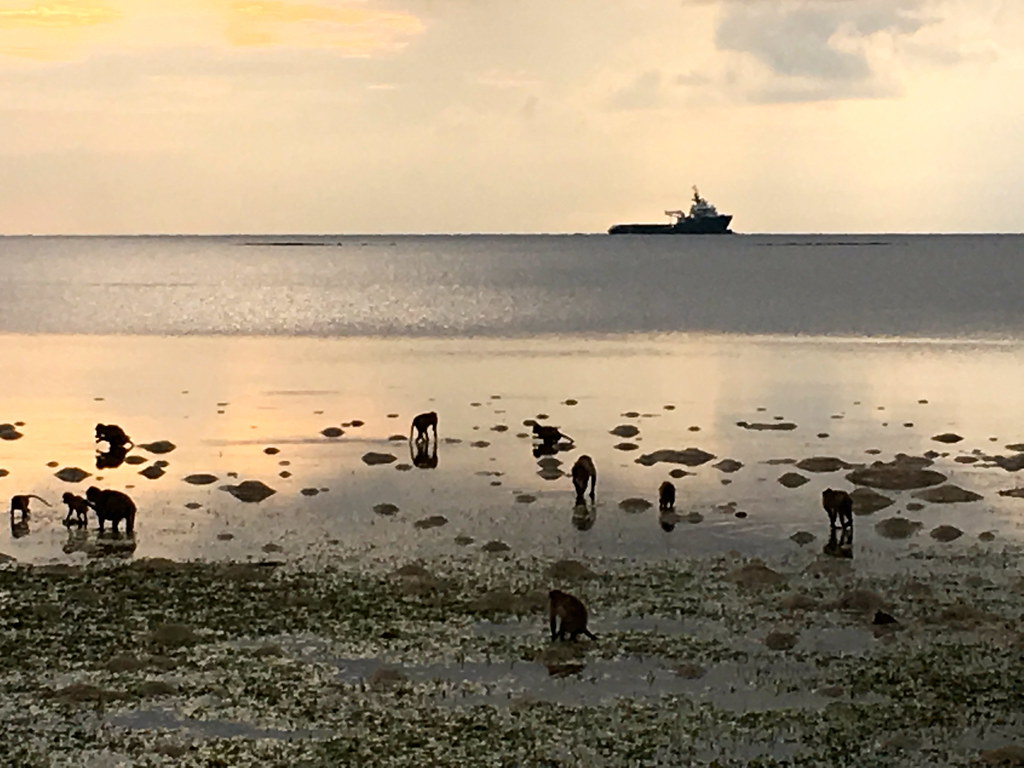
I actually rather want to finish these Indonesia posts so I can get into some traveling I've done in Taiwan recently (two trips to Tainan, one to Kaohsiung and one to Yunlin) as well as put up a few photos from our weekend in Hong Kong, so here's the last one!
After hiring a driver to take us to the airport in Solo, we flew to Banyuwangi, which is not exactly the most hopping town, but the only way to get from Solo to Baluran is to do it this way (other options include train with transfer in Surabaya, or a very slow train service that takes a more direct route but is so exceedingly slow that it will take you a good day and a half to get there with a transfer in some no-name town about halfway. There is no bus that I know of). We wanted to get away from the usual "temple, temple, temple, shopping" tempo of the rest of our trip and thought a stop in a little-visited national park, especially one known for having a beach overrun with monkeys, would be just about right.
When we got to Banyuwangi's Blimbingsari airport, we realized two unfortunate things: first, that there is no public transit from the airport to anywhere; and second, that the airport is 9km south of town while the bus station with buses heading to the park is several km north of town. There was literally no other choice but to take a taxi, as expensive as that was (and it was - it came to over IDR400,000 which is quite a bit for Indonesia, though not that expensive by other standards).
So we took a taxi to the bus station, bus (which tried to cheat us) to the national park entrance, and scooters from the entrance 12km to the coast, past some gorgeous scenery. We started at 7am and got to the beach just after sunset.
We didn't do much at the beach - the weather was grim so we didn't even really swim (we did go wading). I have a thing about not liking to swim on very overcast days unless I'm indoors. We rented the wooden bungalow farther from the hotel and canteen and immediately wished we'd rented one of the concrete cabins just because the very first thing that happened was a mouse scurrying about. We saw two mice in total and scared them off, and got the park rangers to seal off the mouseholes and spray something to repel them...we didn't see them again but also didn't sleep particularly well. This was also the only accommodation we had with a mandi (local-style bathroom), but we knew that going in so it wasn't a big deal. I prefer Western bathrooms when I can get them but I'm not averse to using something like a mandi.
Oh yes, and the canteen was closed the day we were there, so the rangers were nice enough to pick us up some food when they went to the other cabins further inland with the mountain view (where there is a general store and small restaurant more likely to be open). So we got gado-gado with rice for breakfast and ramen and local potato-chip-like snacks for the rest of the day. We'd also brought some cookies, coffee and tea. It was not fun at all keeping the food where we didn't think mice would come after it.
Also, we couldn't eat outside even though we had a lovely little patio overlooking the beach, because the place really was overrun with monkeys (and you do not want a troupe of monkeys to see you eat). They were literally more of a herd, a force of nature, than a group. Locals who day-tripped to the beach and weren't prepared found motorcycle helmets stolen, bags grabbed, unzipped and rifled through, snacks seized and gobbled down. They would try to come on our porch when we were reading and we'd have to wave a broom around and talk to them sternly the way we'd talk to our cats. Once, one of them figured out we were eating inside and got up on the porch, perched himself in the window and watched us eat, his little macaque face pressed against the glass as we slurped instant noodles.
This is not to say we didn't like our very rustic stay. I loved hanging out on the porch reading books as the weather changed above us, walking to the mangrove estuary, walking in the other direction to a string of more secluded beaches where we found interesting seashells (which we did not keep) and played in the water, or just sat on the beach and talked, watching the monkeys play.
The next morning we got up, had a leisurely meal of nasi goreng and coffee, arranged scooter rides back to the main road and caught the bus to Surabaya. We had to change buses once to one that was decidedly worse, and we got caught in traffic and had to navigate the dodgiest bus terminal in perhaps the entire country, but on the bright side, I had a nice long friendly chat with a local guy who could speak English and had a refreshingly feminist worldview (and knew a lot about Taiwan as his job was gathering edible seaweed, and he sold it to a Taiwanese guy).
Unlike life in Taiwan, or my study abroad in India, or to some extent life in China, when you take these short excursions, you don't get the same chances to interact with locals and understand, a little more deeply (if not terribly deeply) the lives, experiences and perspectives of people with experiences very different from your own. So, when the chance does present itself I'm always pleasantly surprised.
Anyway, we landed up in Surabaya later than we'd have liked, had dinner at a fancy shopping mall and a few drinks at the Hotel Majapahit with our Hungarian friend in Surabaya, and flew out the next morning. We had half a day and an overnight in Singapore on the way back which I thought was great, because I'm always happy for a chance to enjoy some time there, and then it was back to Taipei and the daily grind. (Perhaps in a future post I'll throw up a few Singapore snaps).
As usual, here are the links to the other posts about this trip:
Surabaya
Borobudur
Prambanan
Solo (Surakarta)
Baluran National Park
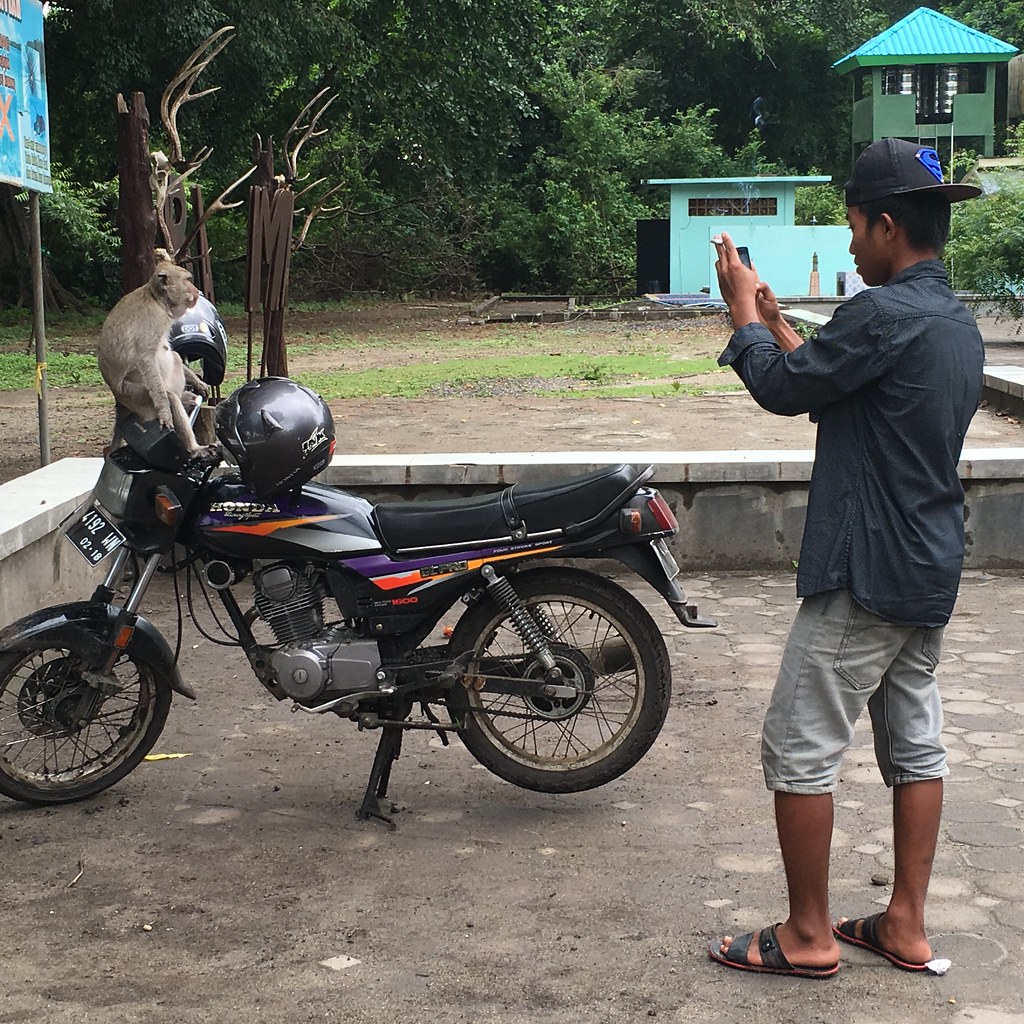
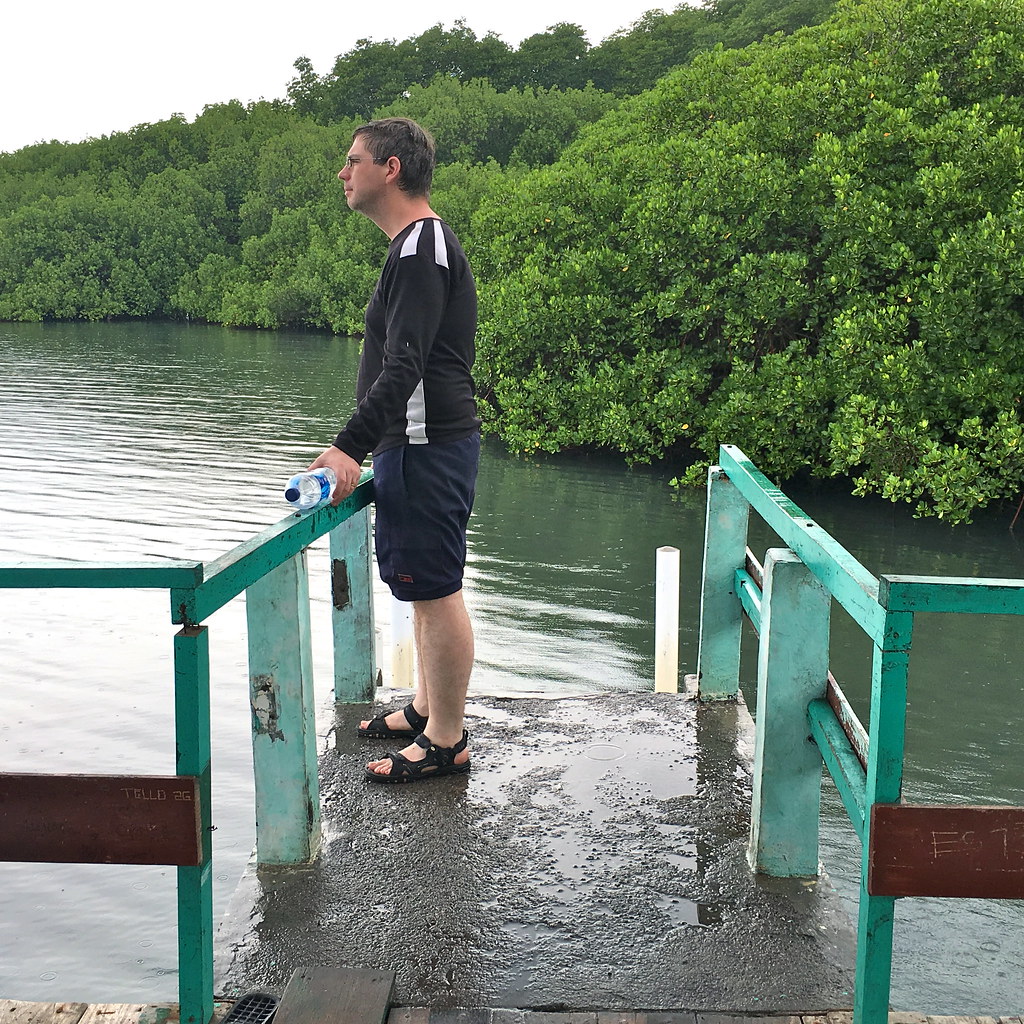
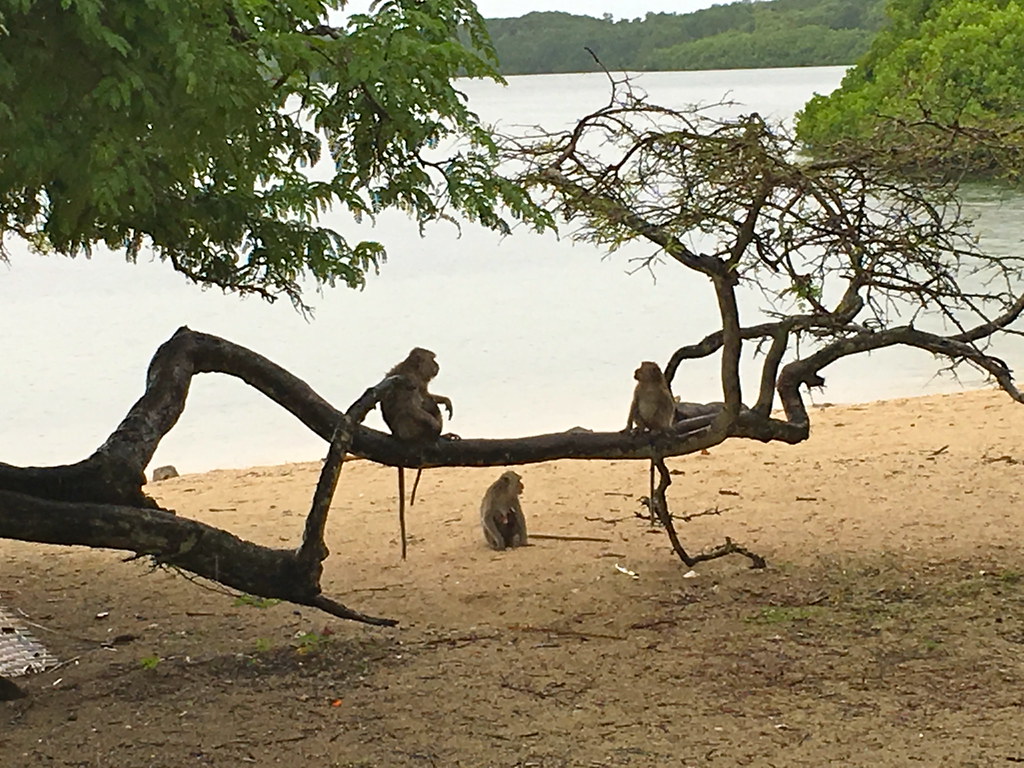
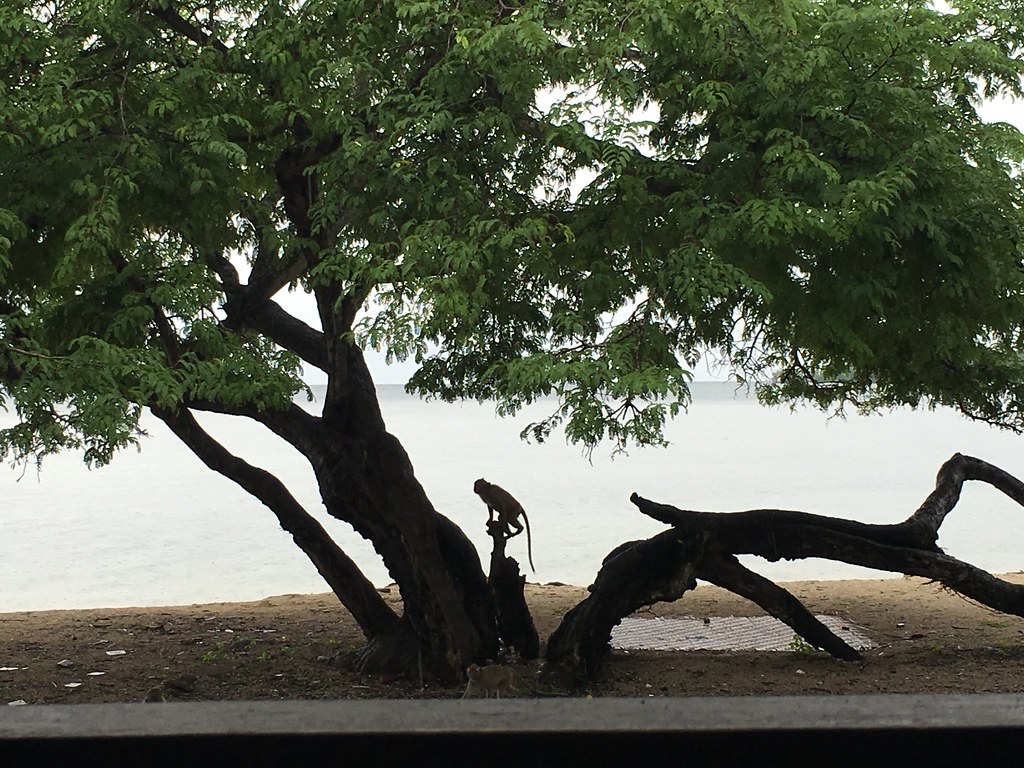
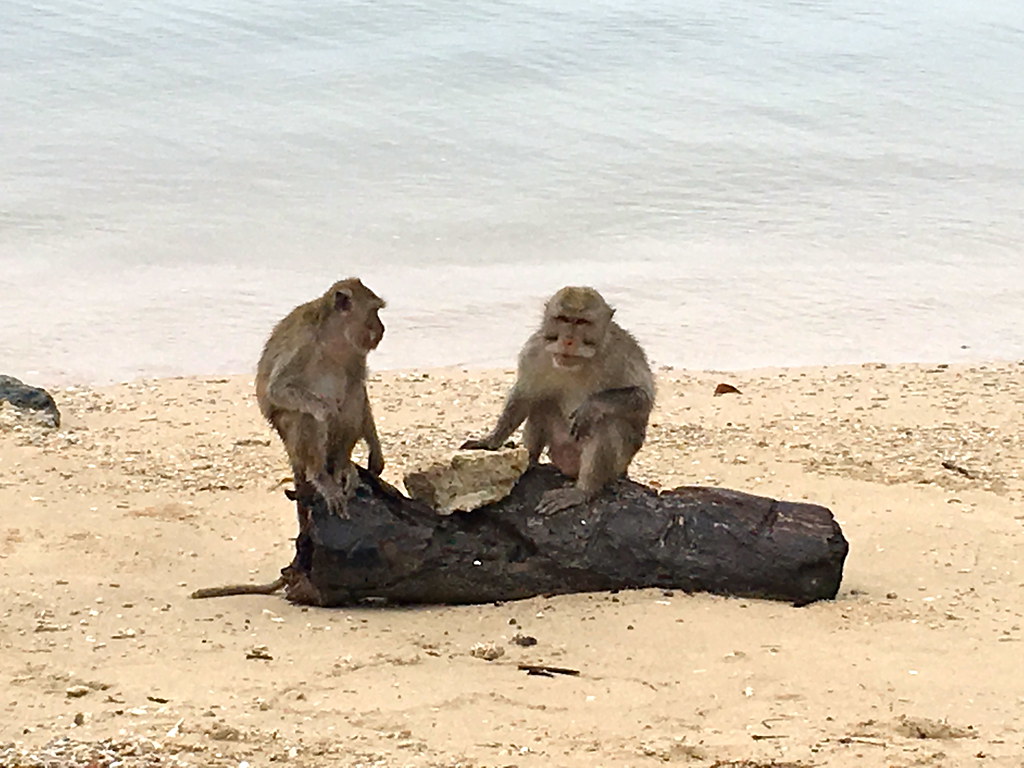
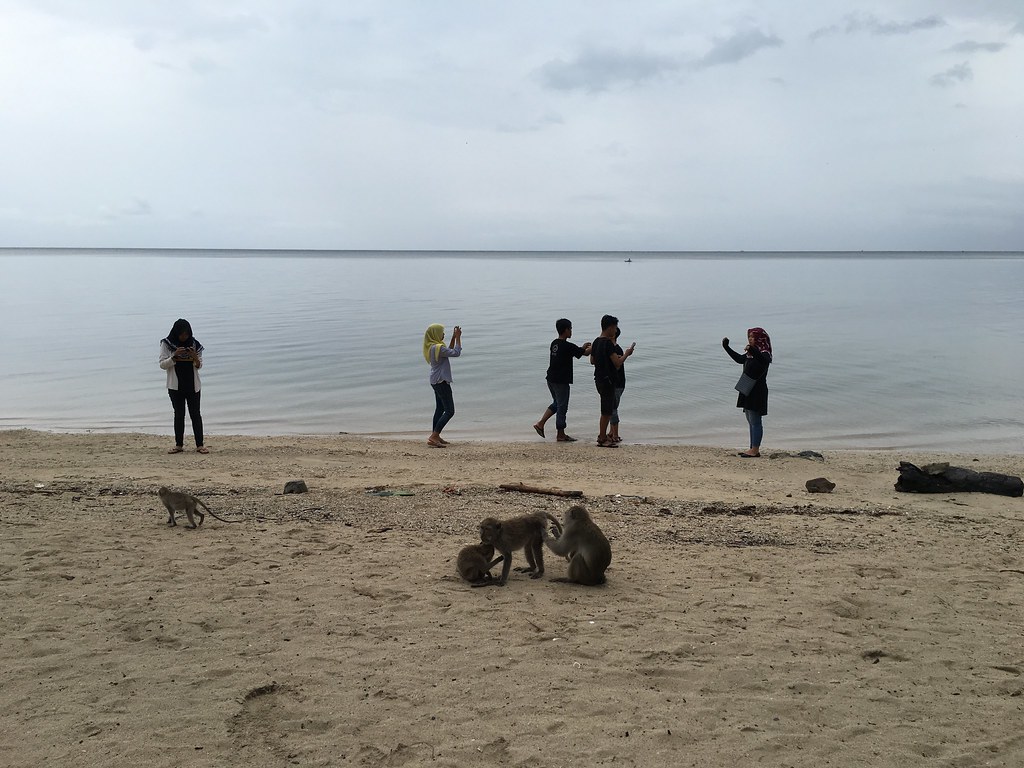
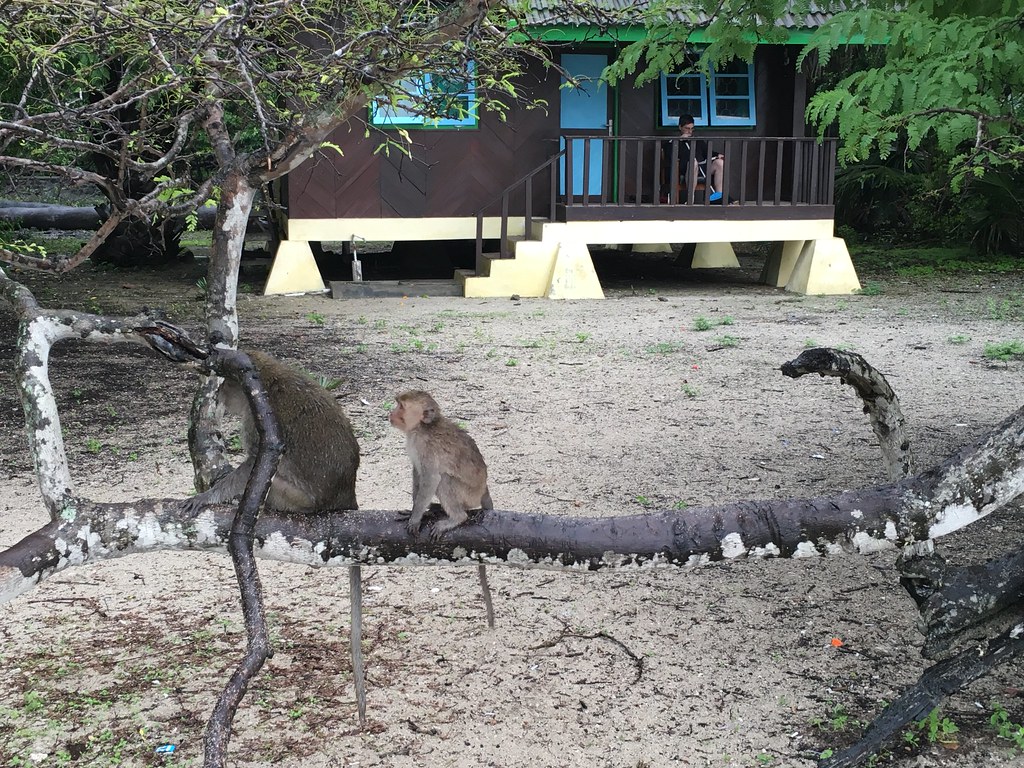
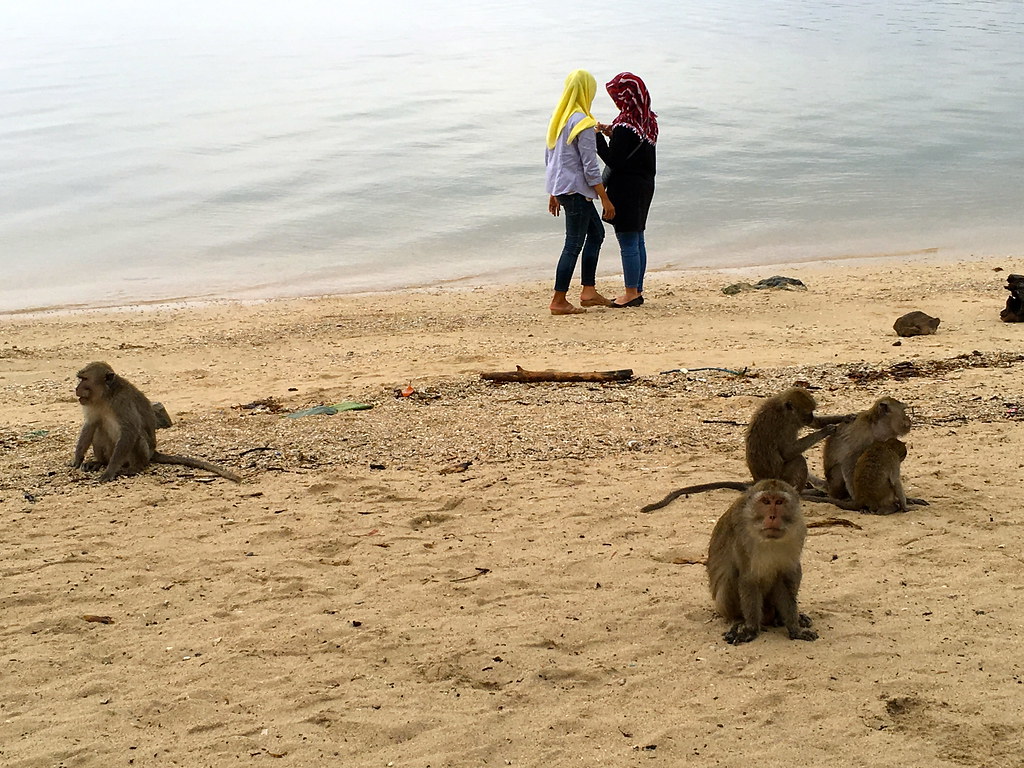
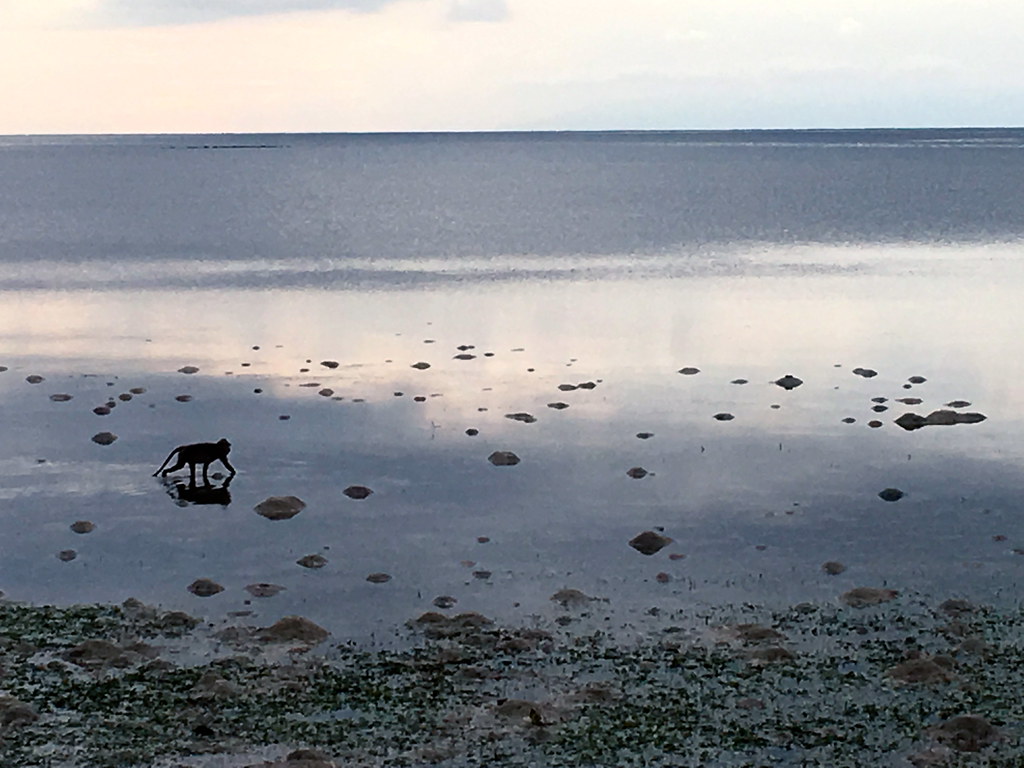
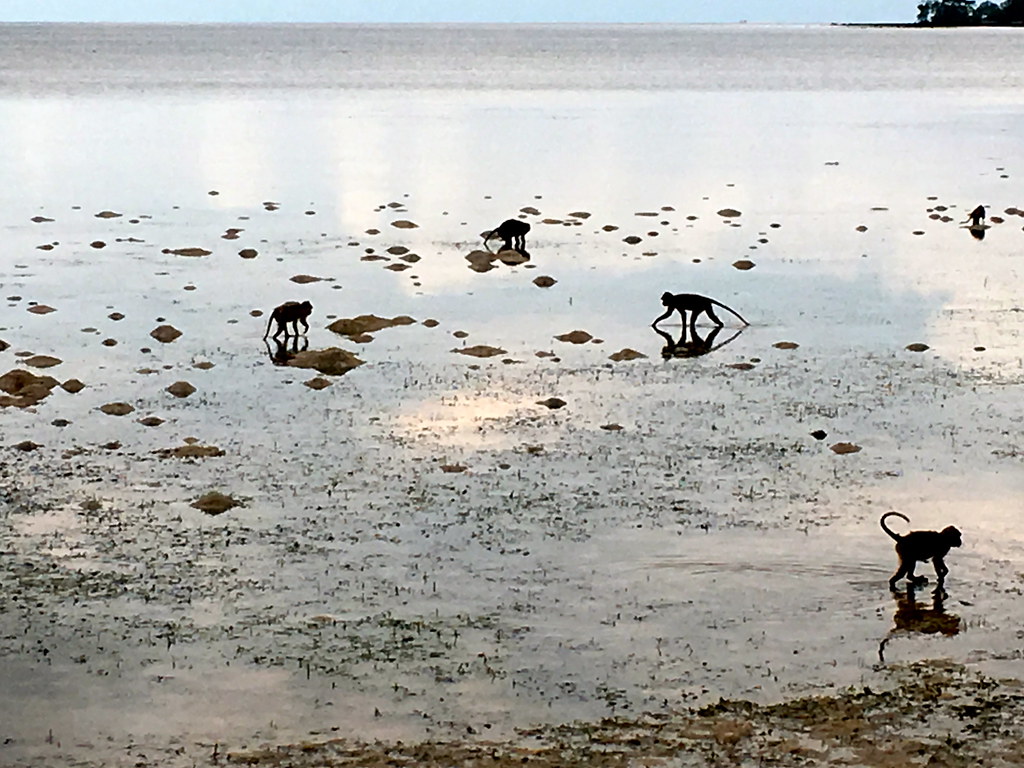
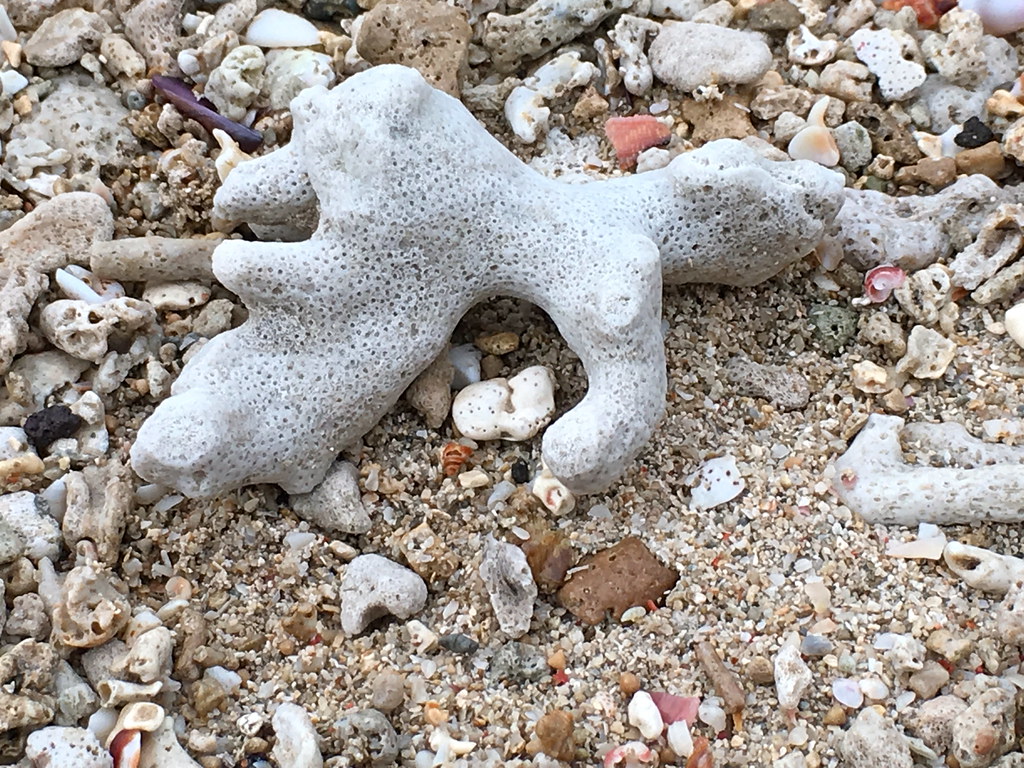
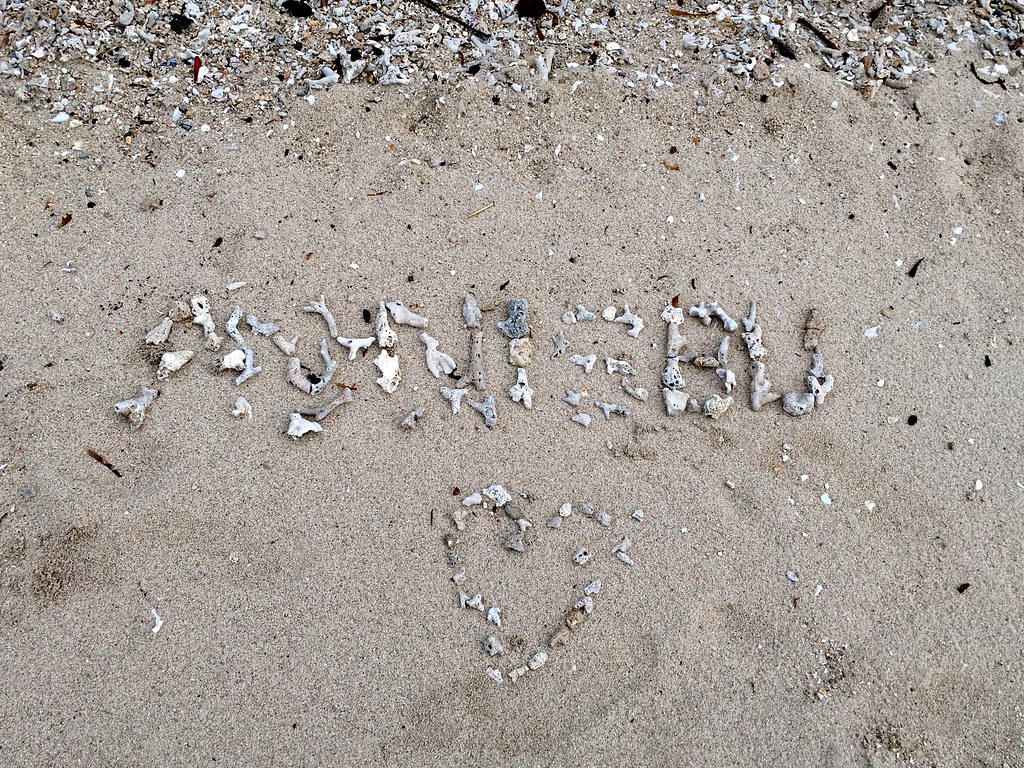
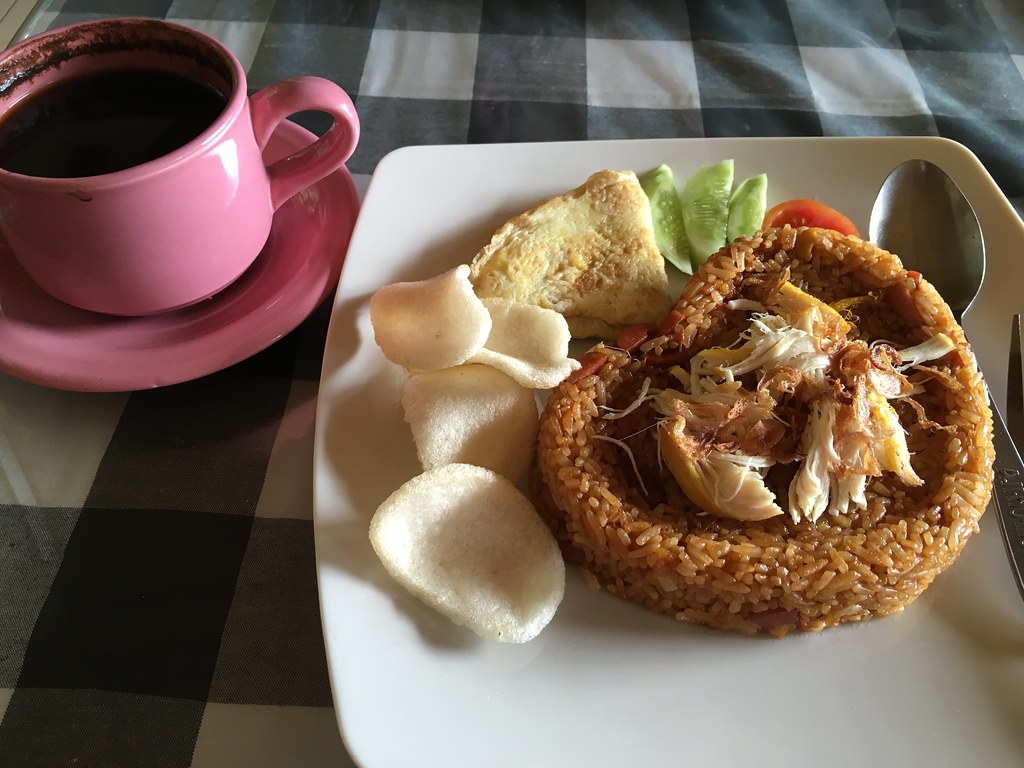
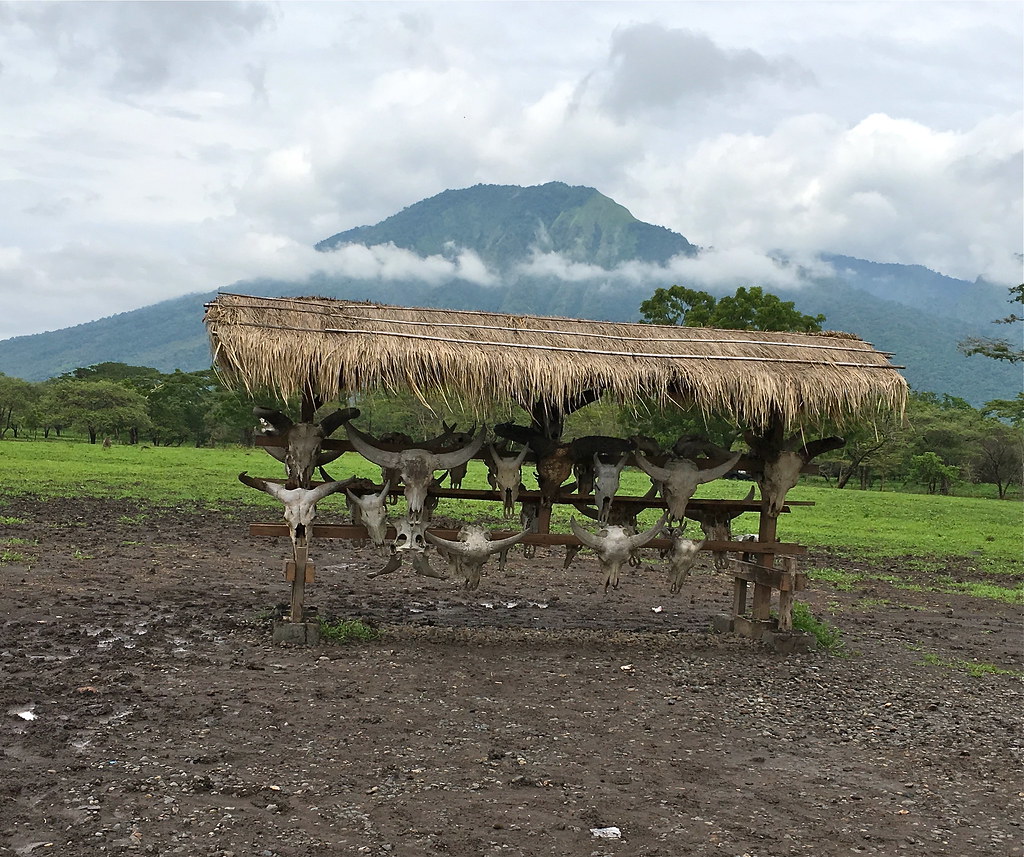
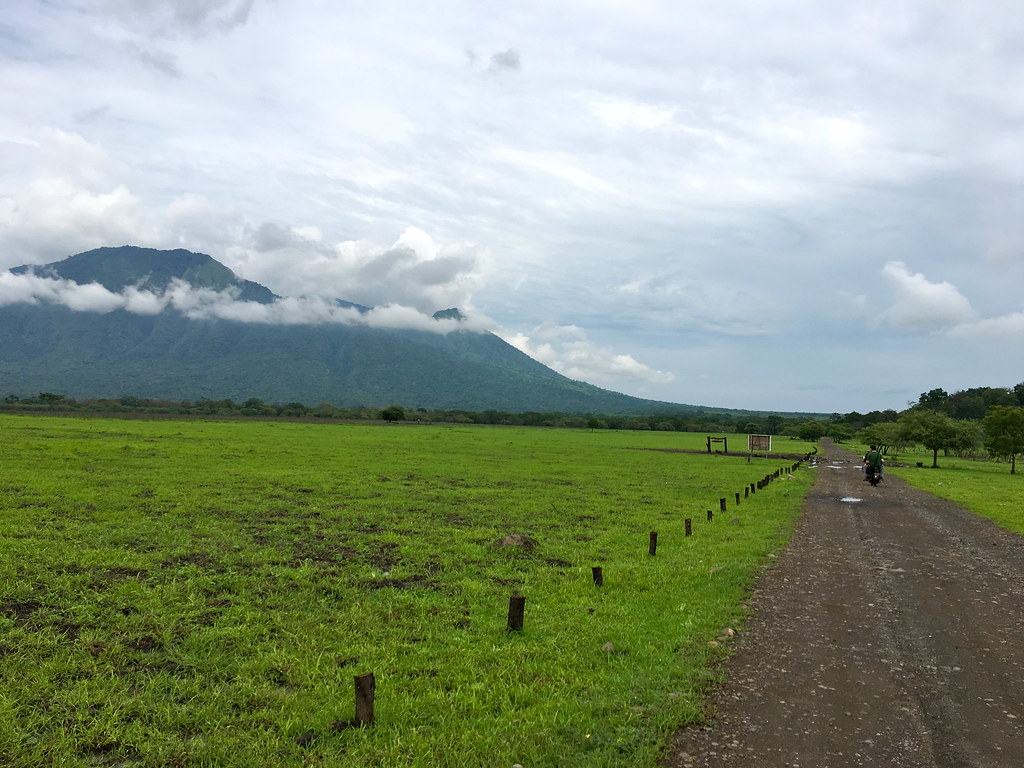
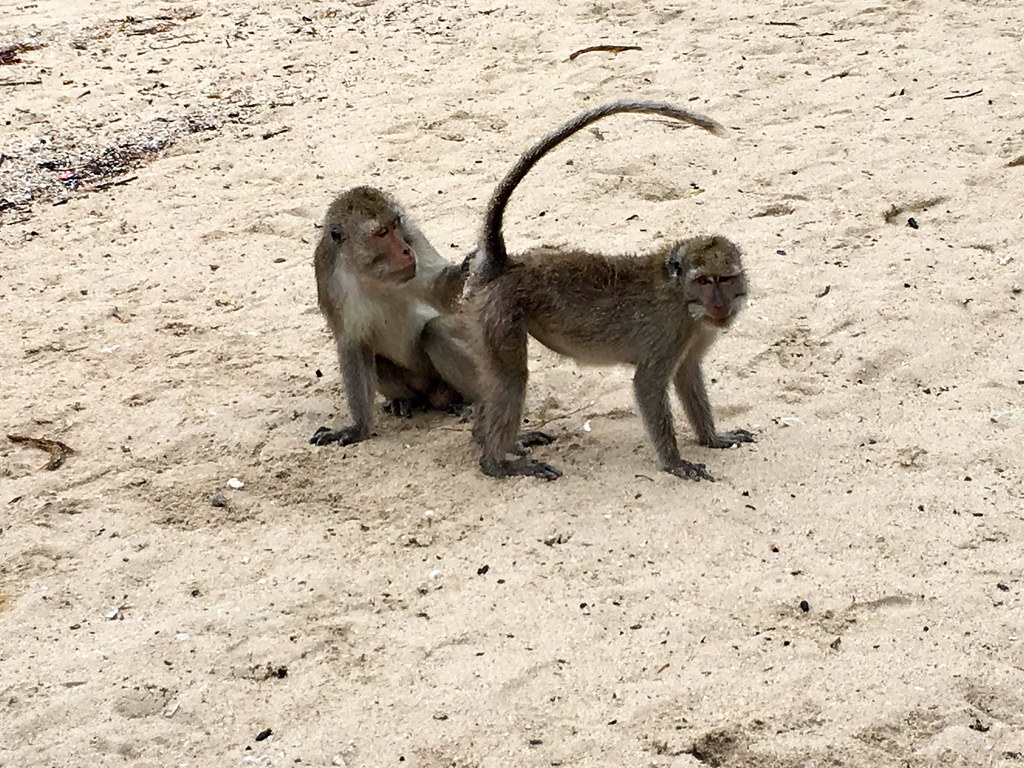
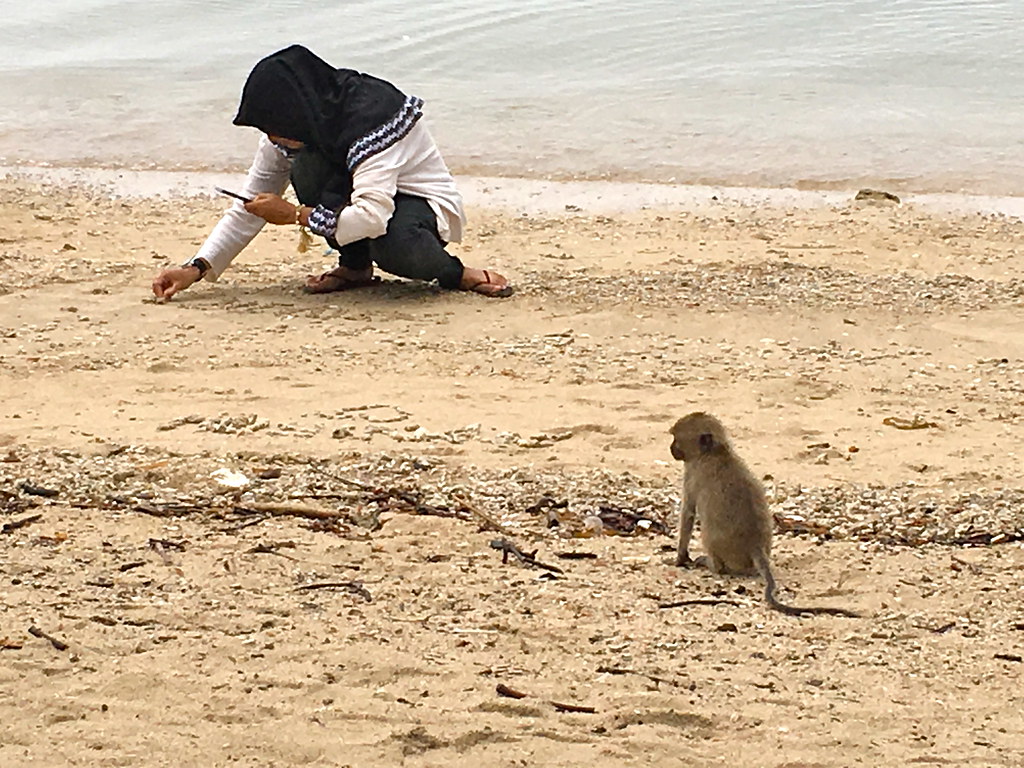
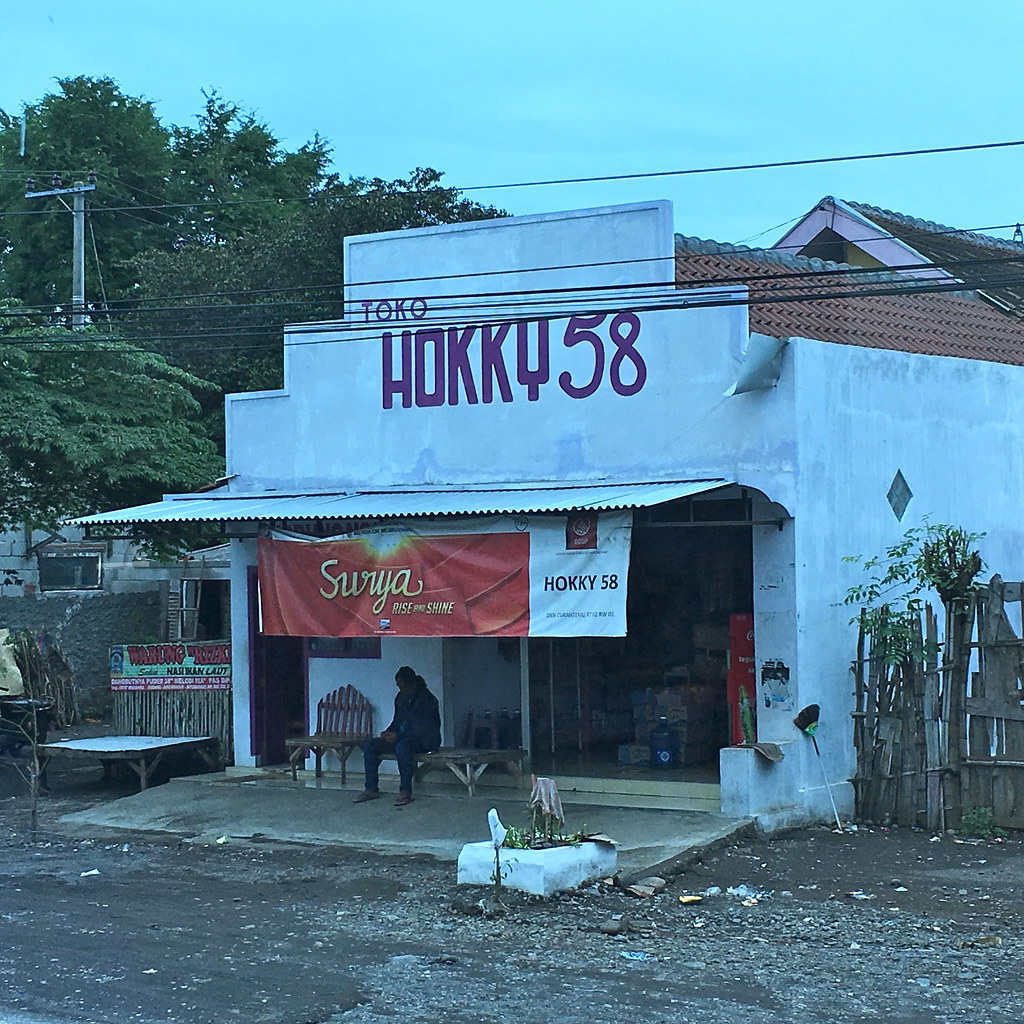
Saturday, July 23, 2016
Indonesia: Solo (Surakarta)
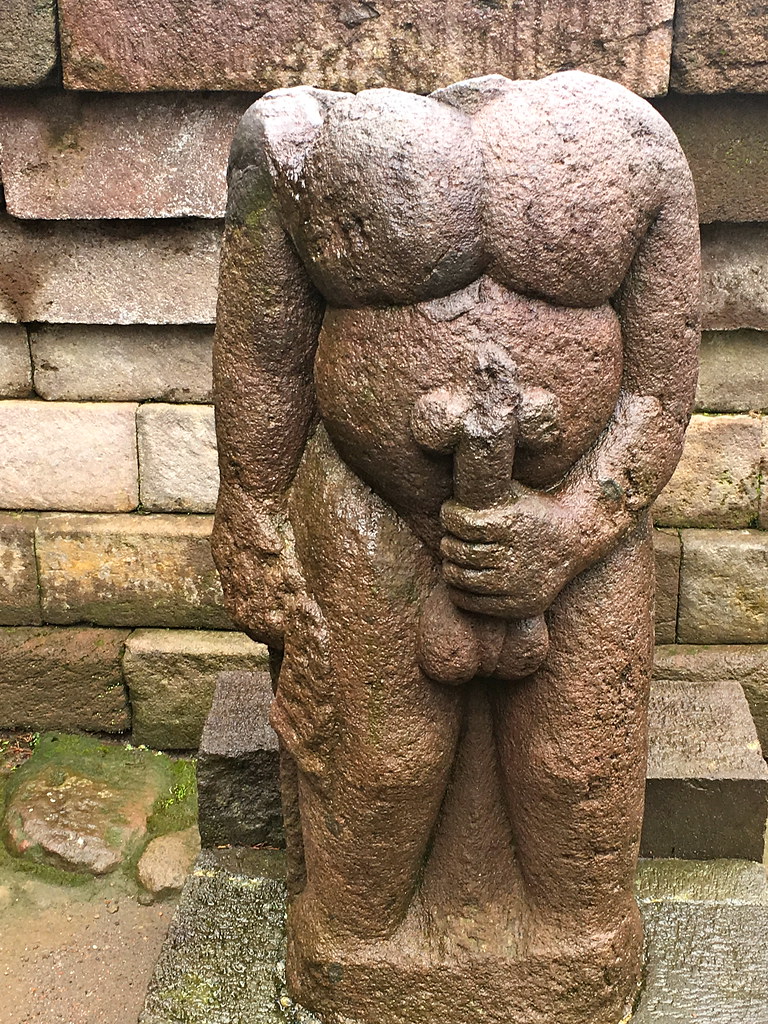 |
| Well hello there Mister Mister |
So, I have to admit, we didn't see much in Solo proper. We arrived in the evening and stayed at the wonderful Roemakhoe Heritage Hotel, a hotel situated in an Art Deco house with close attention paid to decoration and detail and tons of original elements. Also we got a room for something like $45 US/night, because Indonesia is a country where you can get great deals on accommodation (our hotel in Borobudur was even cheaper and it came with a full bathtub and was also very nice). Included at Roemakhoe is afternoon tea, and one of the best things to do on a monsoon-pouring afternoon in the whole city is to just hang out in their Indonesian Art Deco (basically Dutch colonial) restaurant and drink tea and eat the free banana-based sweets that come with it while reading novels.
The next morning we arranged a car to take us to two temples on a nearby hillside, through gorgeous tea fields and up winding mountain roads; Candi Sukuh and Candi Cetho. These two temples are more indicative of a native Indonesian style rather than having the flavor of Indian or other Southeast Asian imports (though both are of Javanese Hindu origin from the 15th century). Other temples have stronger Buddhist or Hindu influences, these were devoid of such callbacks, having more of a Pacific Islander/Oceanic feel. Also, way more penises. WAY more. In the pictures below, Candi Cetho is the one that looks like a crazy alien dimensional portal, and Candi Sukuh is the one that looks like a pyramid imported from Mayan ruins. I don't know much more about these temples so I'll leave it there rather than try to disingenuously play the expert on Indonesian temple architecture and religion.
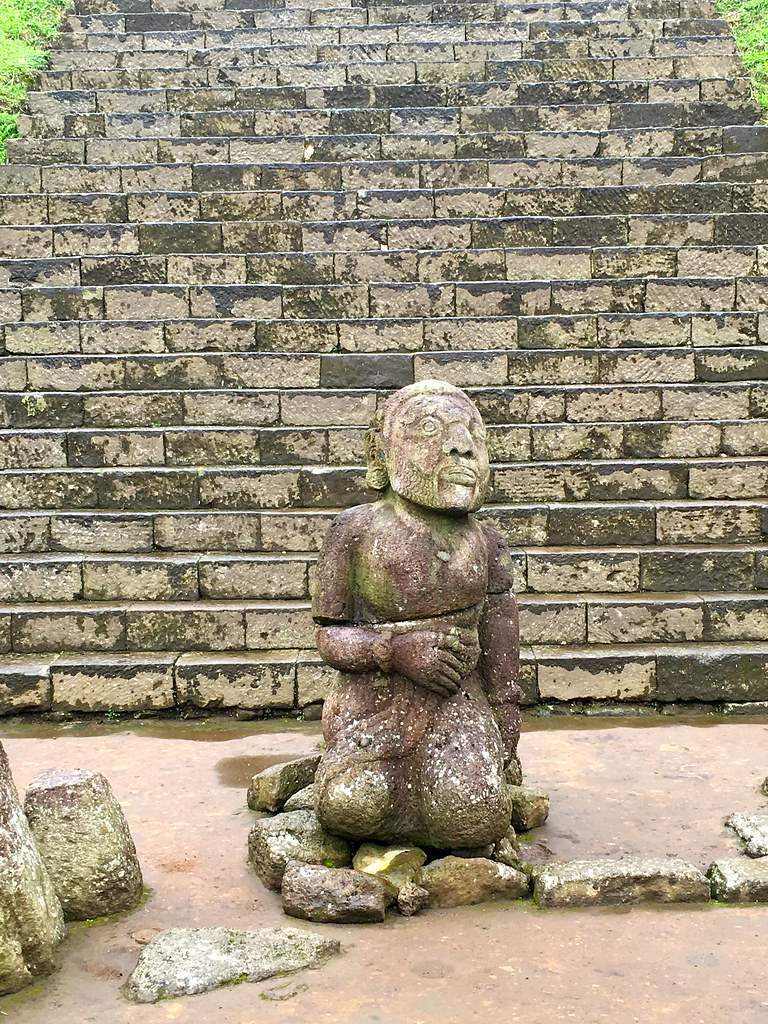
We had then planned on seeing some sights in Solo proper (we decided to head for the mountain first as the monsoon rains tend to hit in the afternoon - rather like in Taiwan - and it's easier to get around a city than a mountainside in a downpour). But, well, by the time we got to the kraton (local ruler's palace), it was closed for the day due to low tourist turnout, probably thanks to the rain. We went to the other kraton, the smaller but more beautifully decorated Mangkunegaran Palace, to find it had been closed for days in preparation for the wedding of some younger son of the family. So, we were driven in driving rain to the Danar Hadi batik museum to find that the museum itself was closed: the rains had caused part of the roof to fall in. But the store was open, so we just went shopping! Kind of a shame, I know, but frankly it was all OK. We did our shopping then returned to Roemakhoe for tea and to read away the afternoon, and left the next morning.
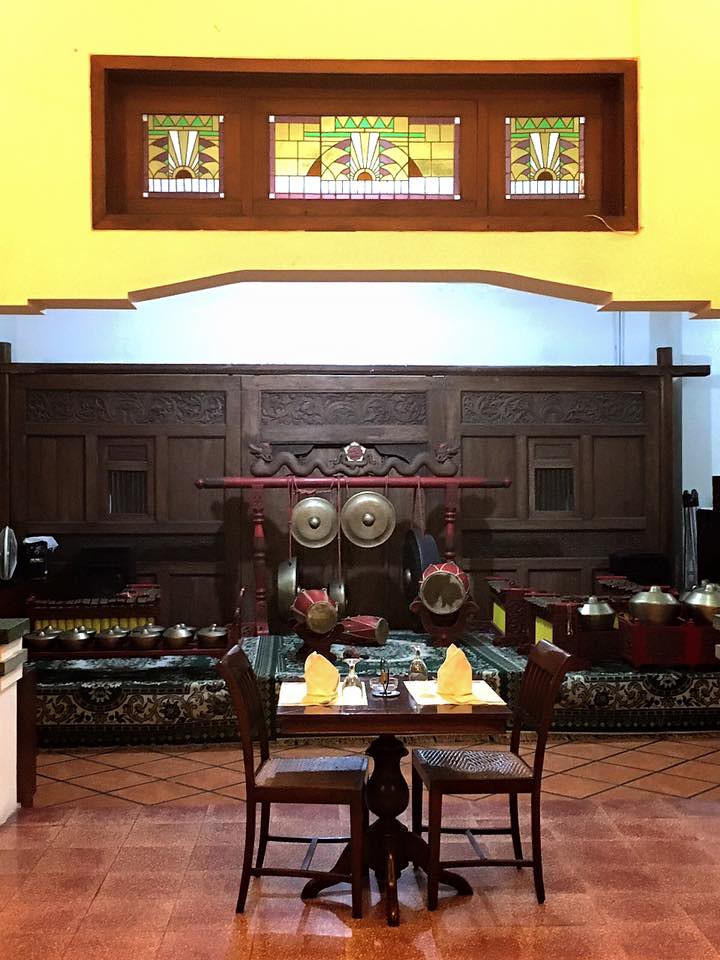 |
| Hanging out at Roemakhoe |
Note: we actually saw Candi Kalasan and Candi Sari, mentioned in the Prambanan post, on the way to the airport at some ridiculous time like 7am. They're right on the way, and we'd missed them due to rain on the way to Solo. So, our driver gamely stopped at both. I included them in the Prambanan post for ease of reading as they are geographically better categorized there, not in Solo.
Check out my other posts on Indonesia:
Surabaya
Borobudur
Prambanan
Surakarta (Solo)
Baluran National Park
Anyway, enjoy some photos!
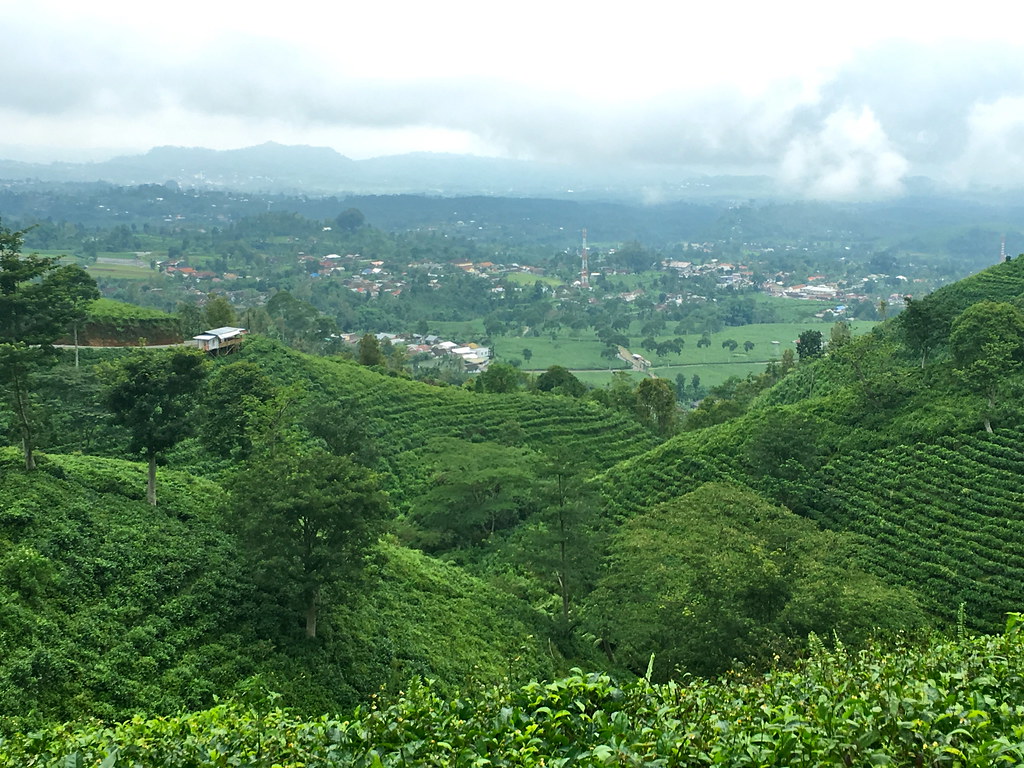
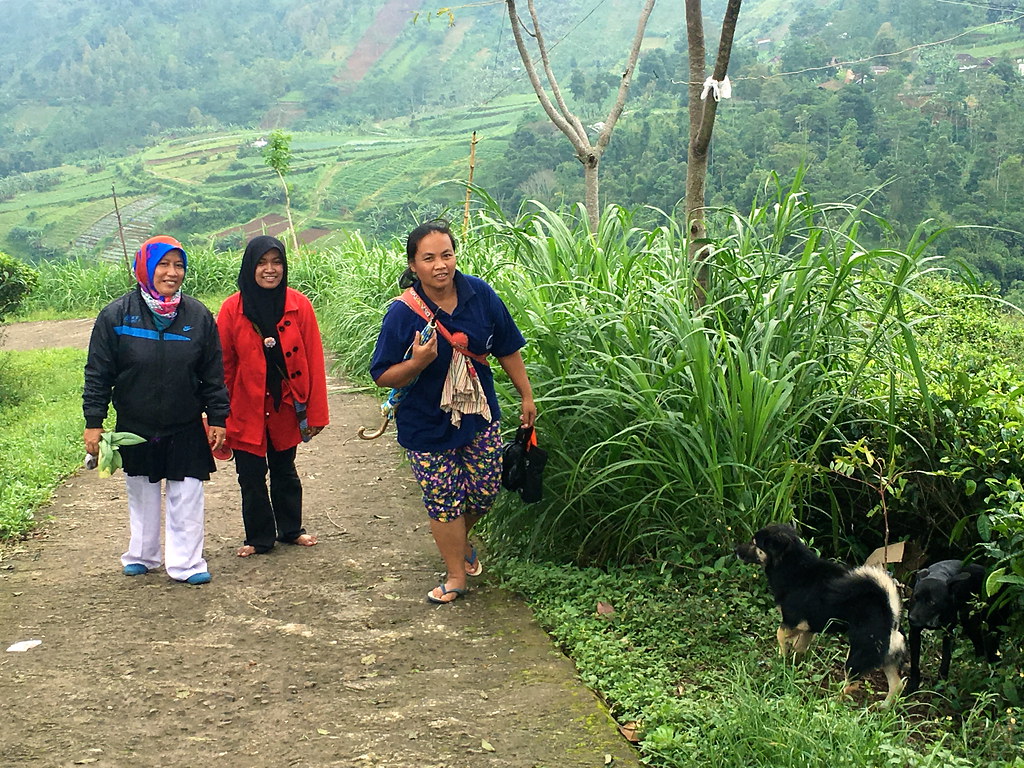
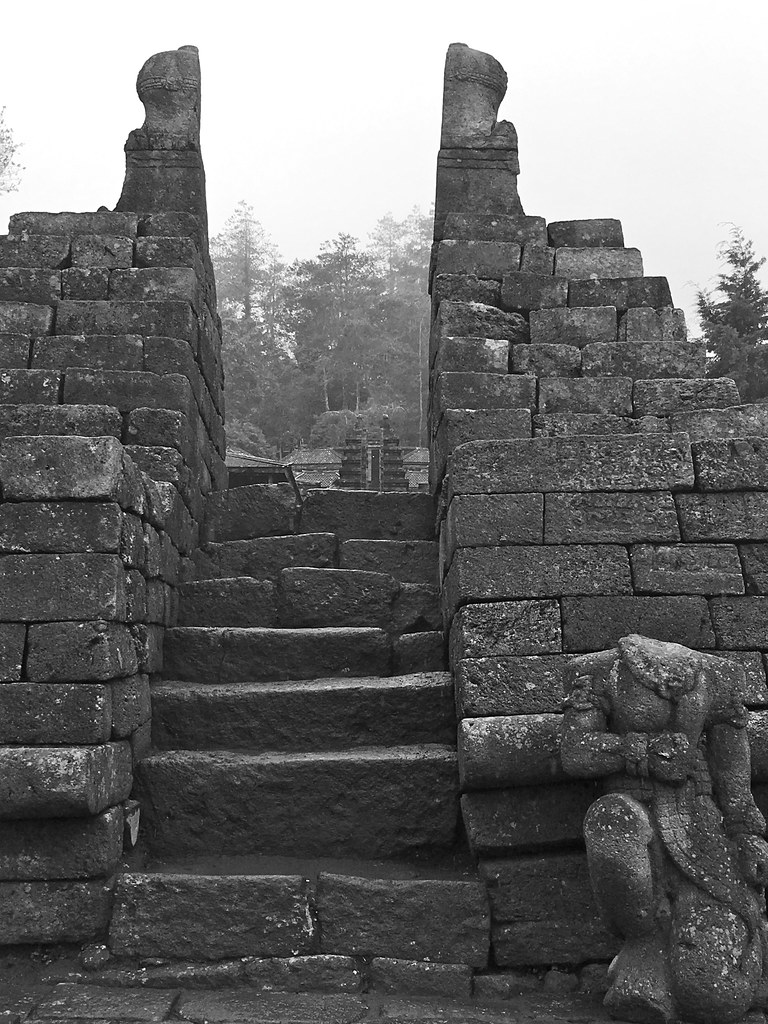
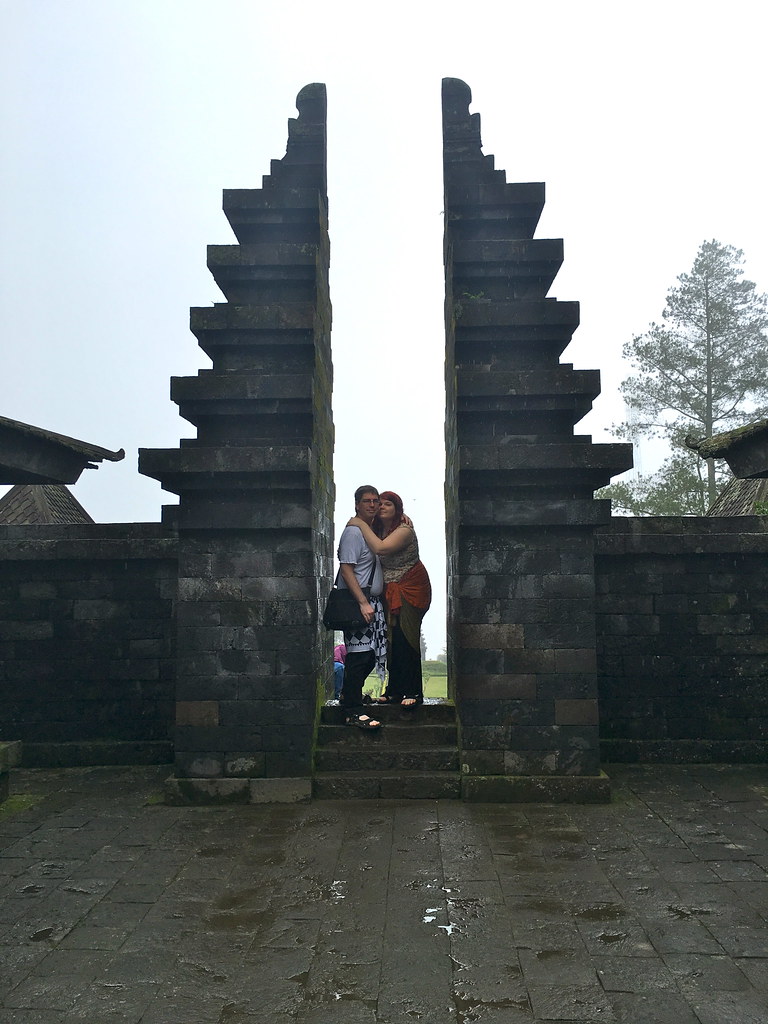
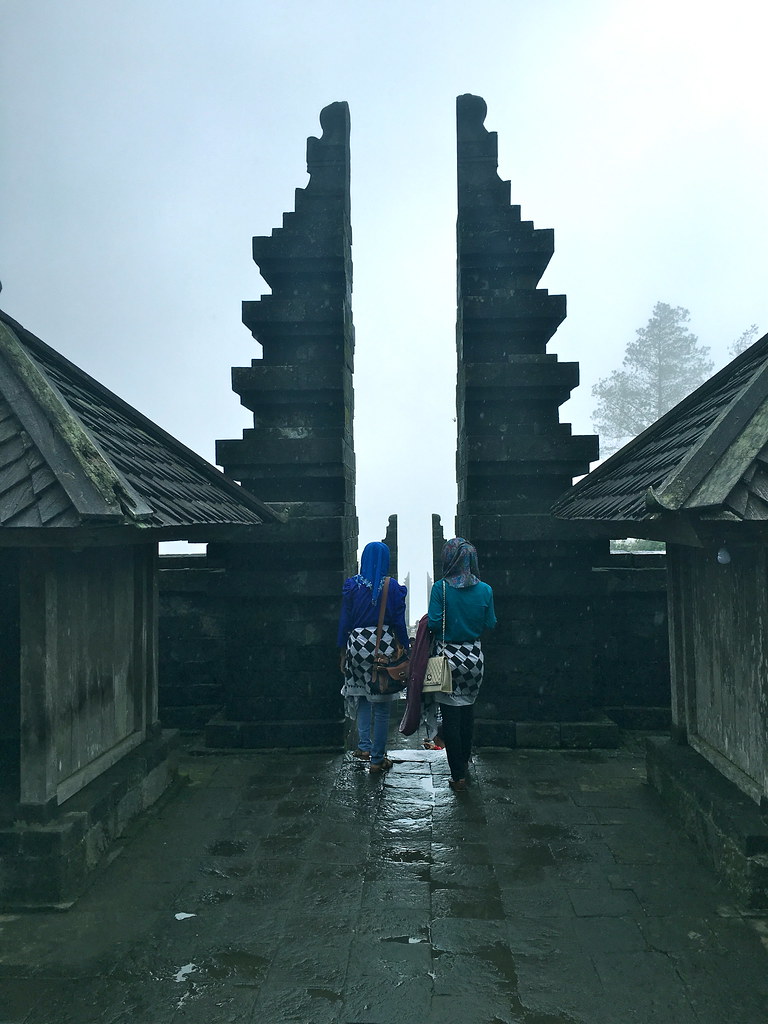
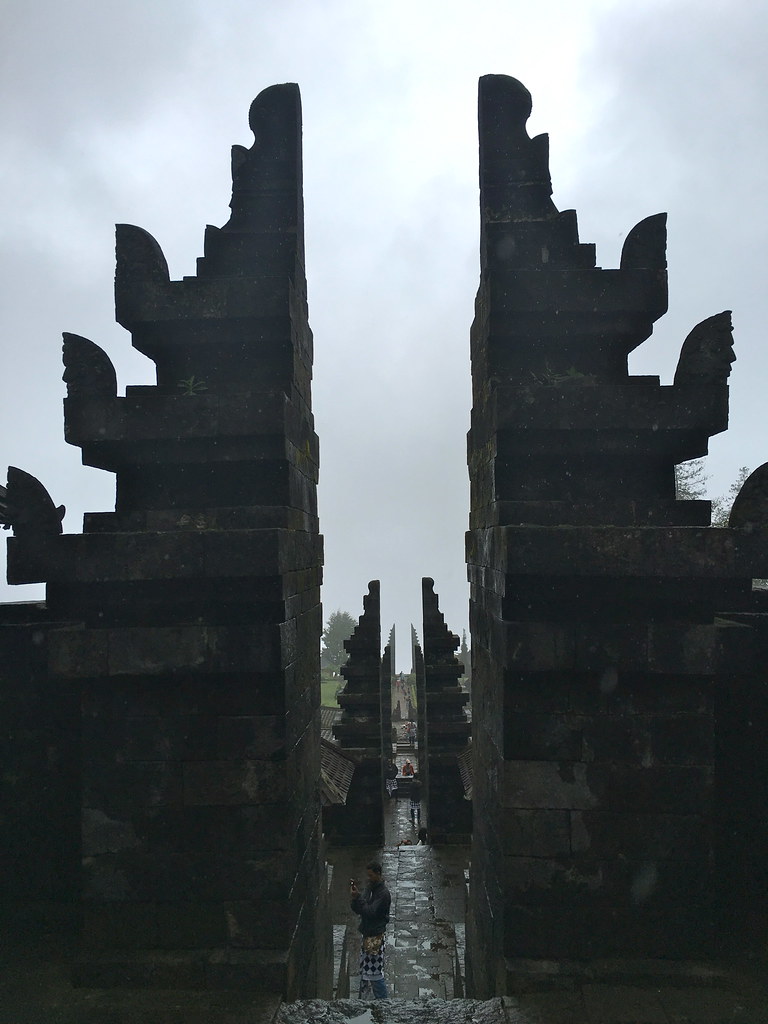
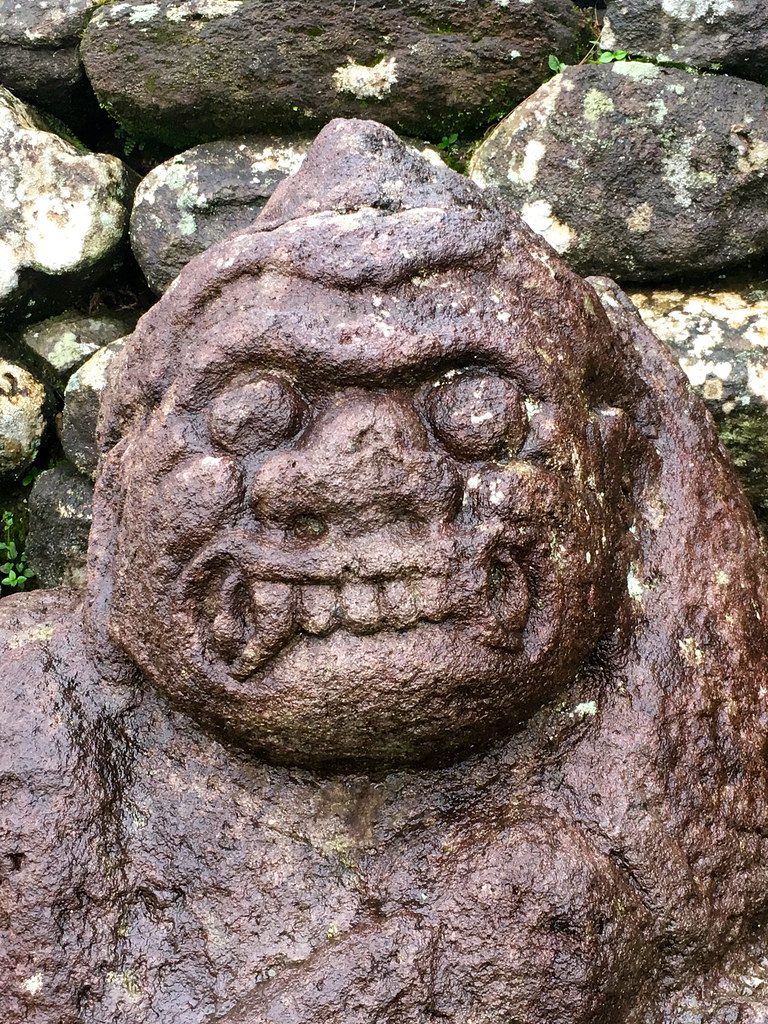
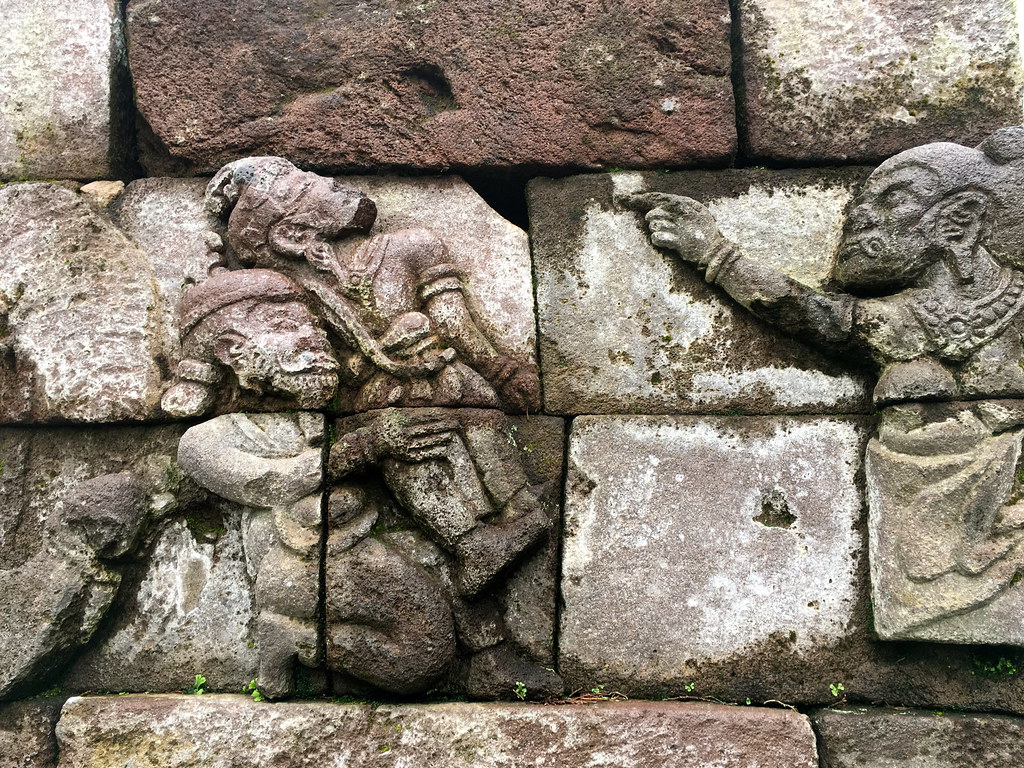
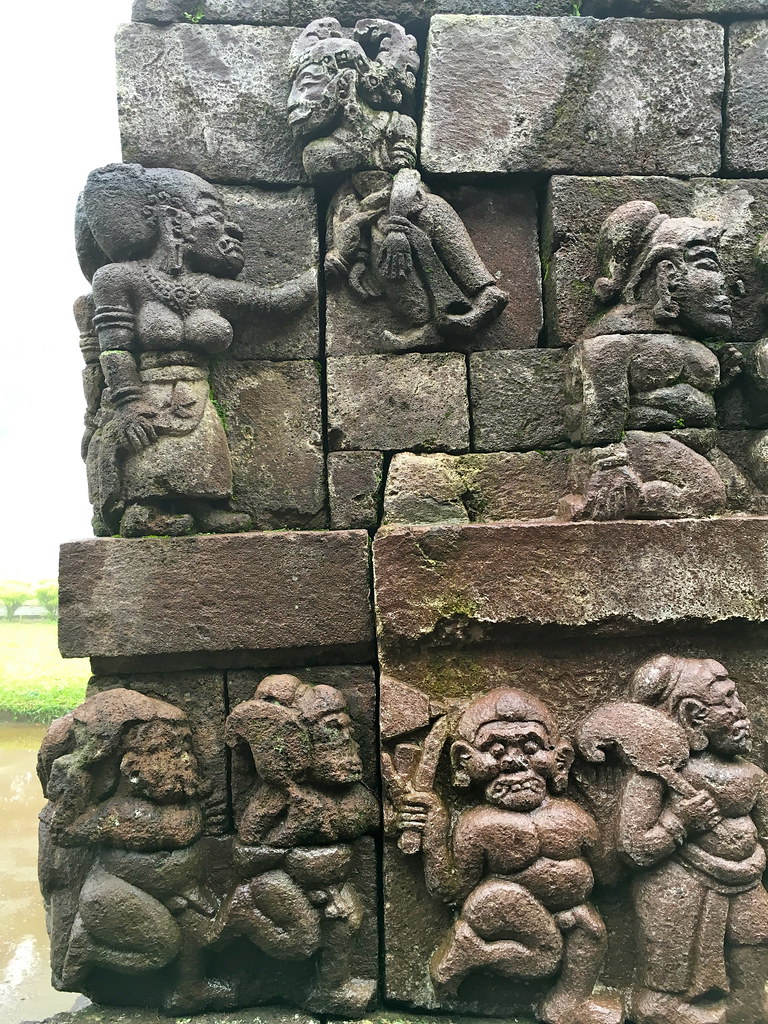
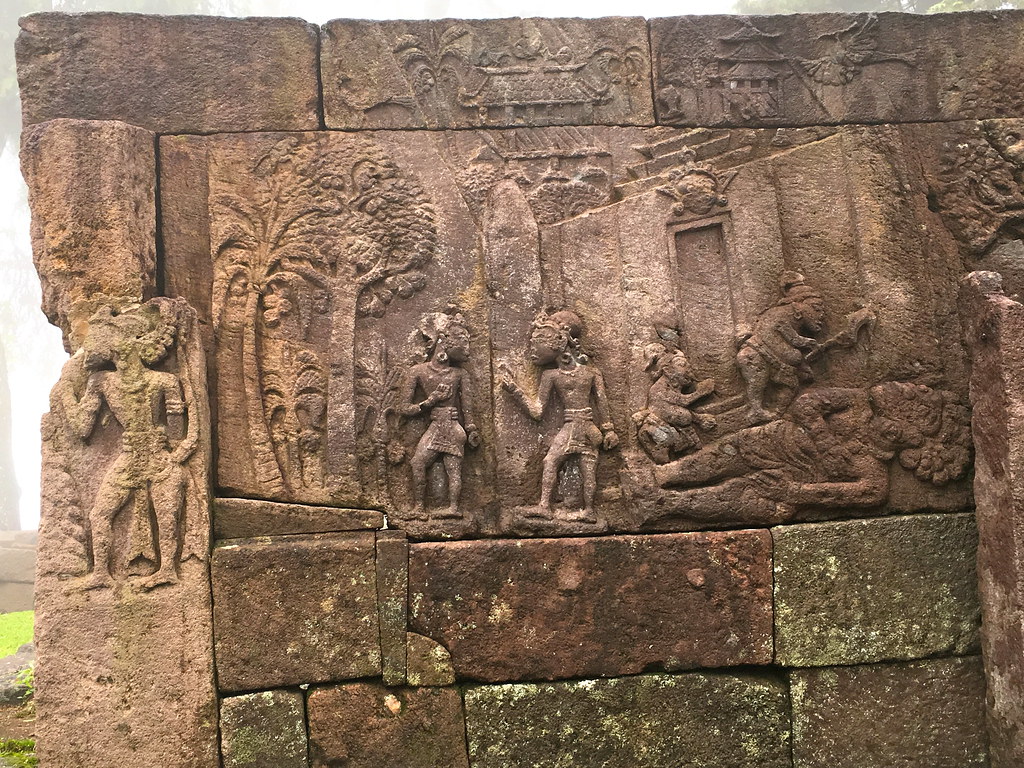
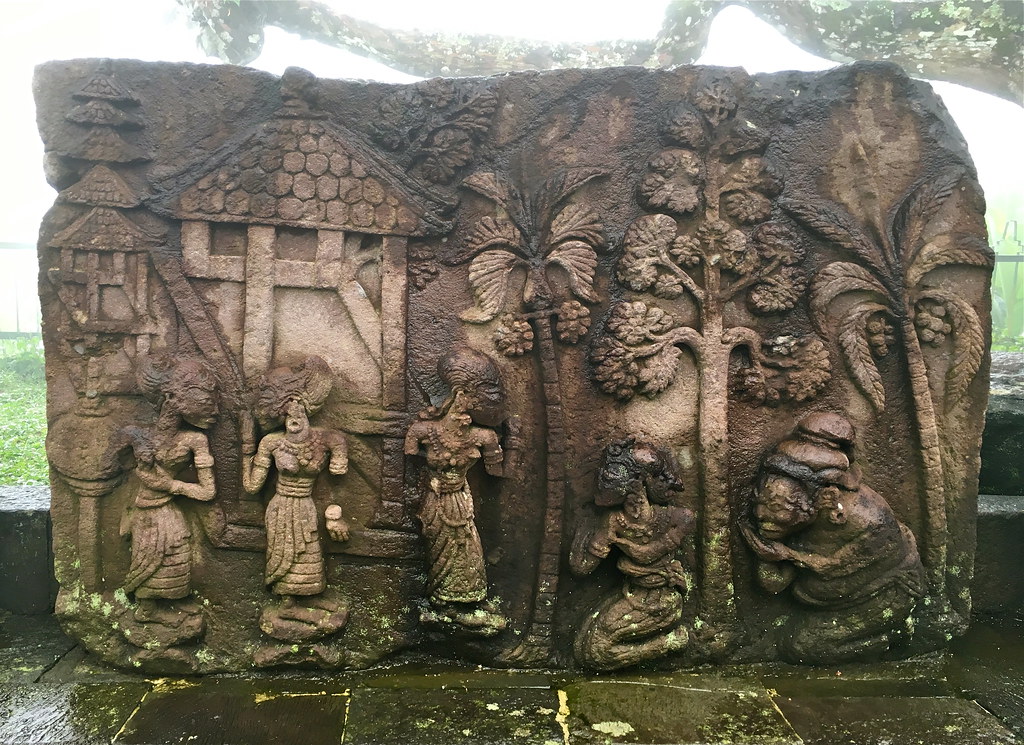
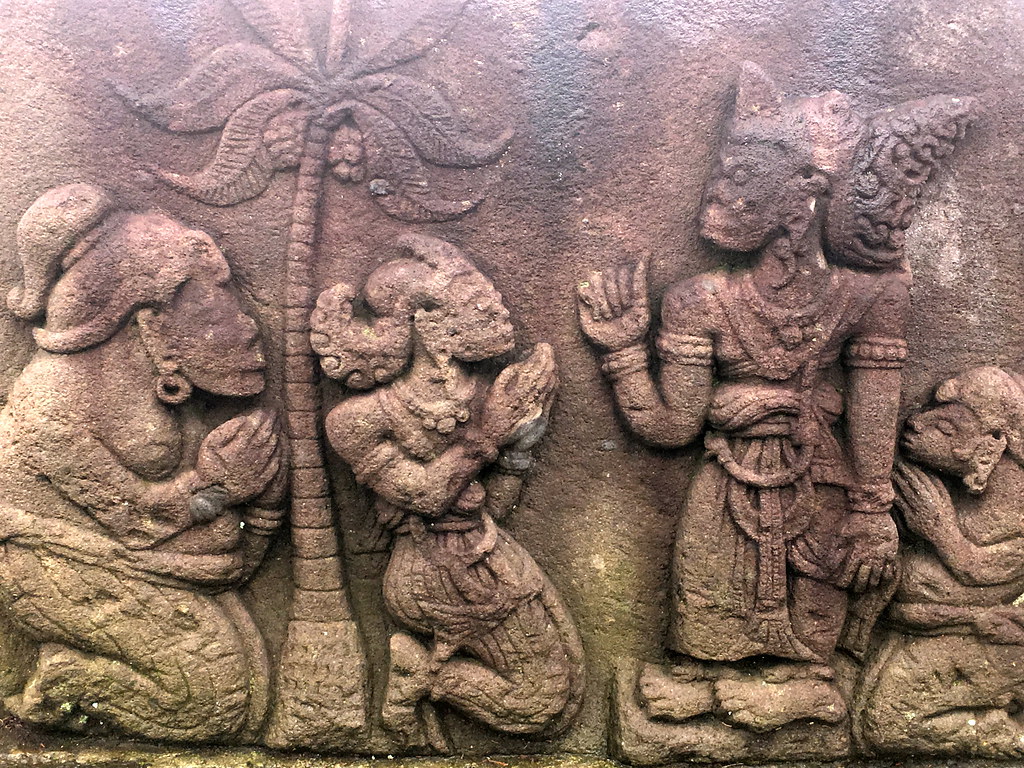
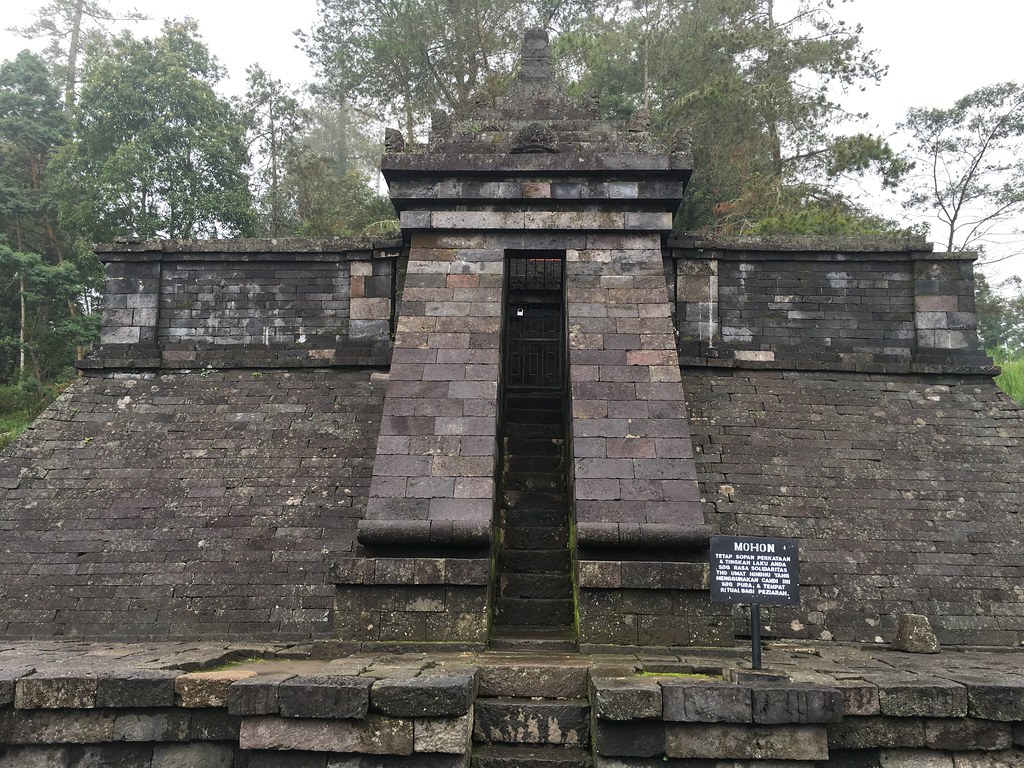
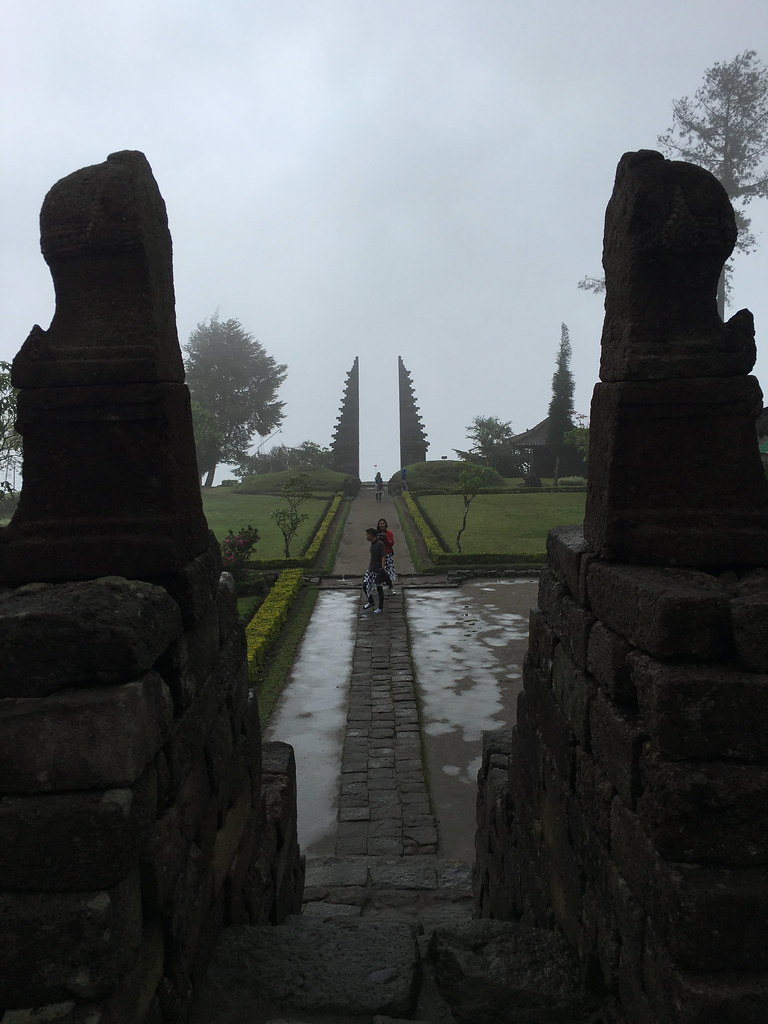
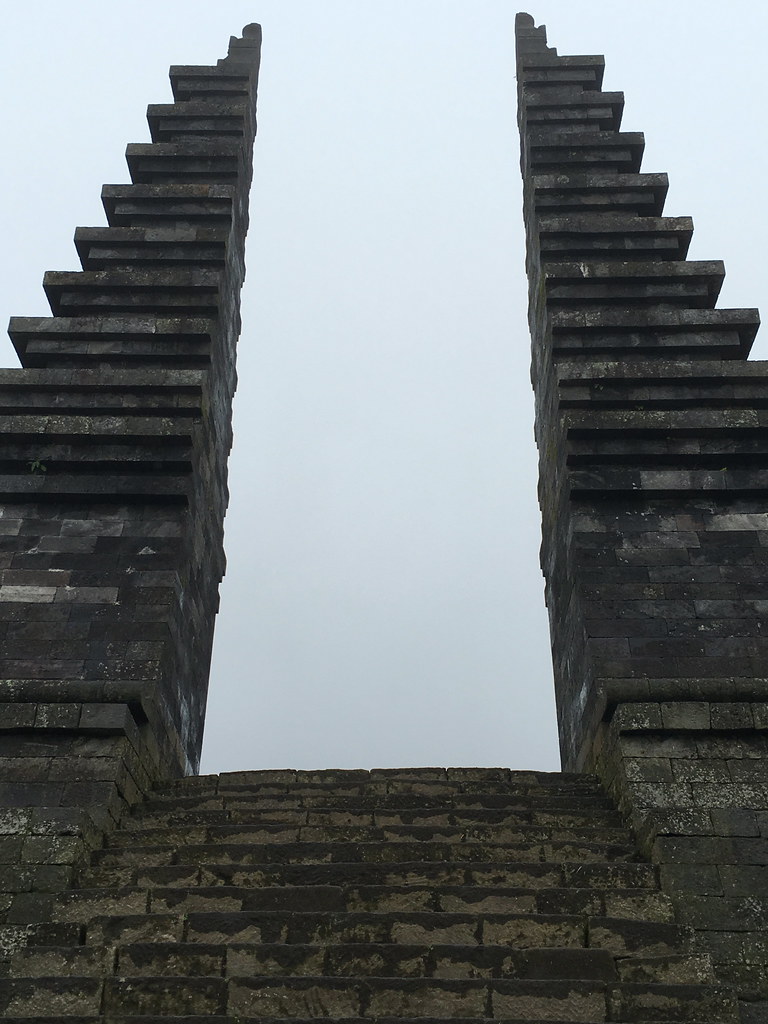
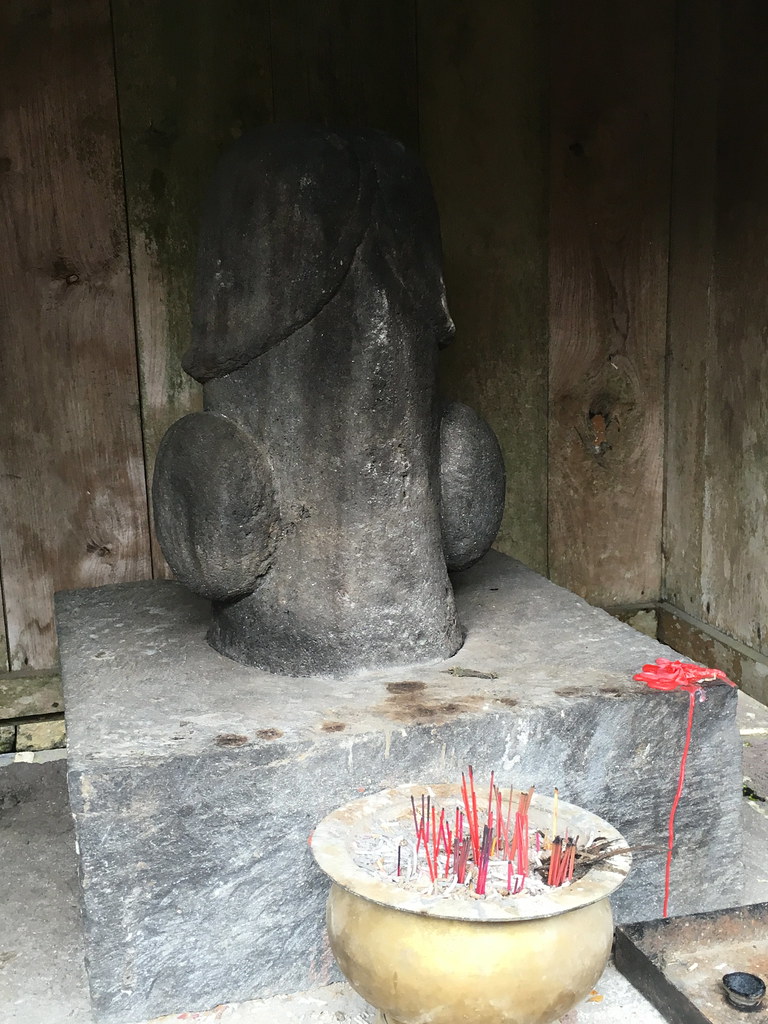 |
| 好吊喔! |
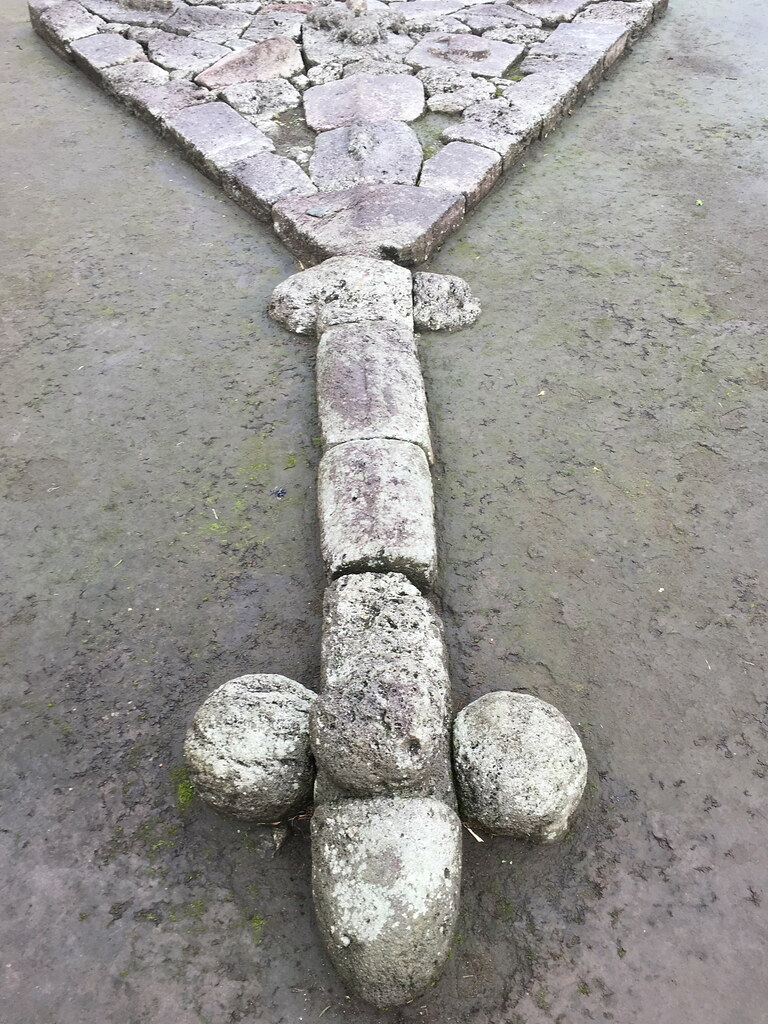
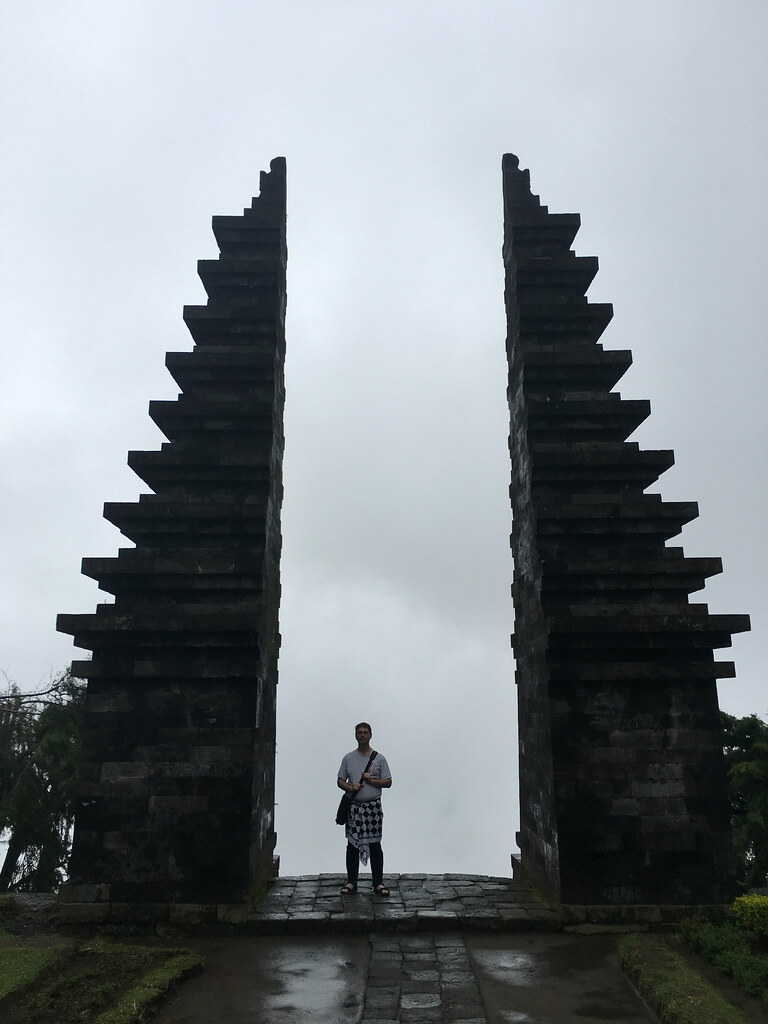
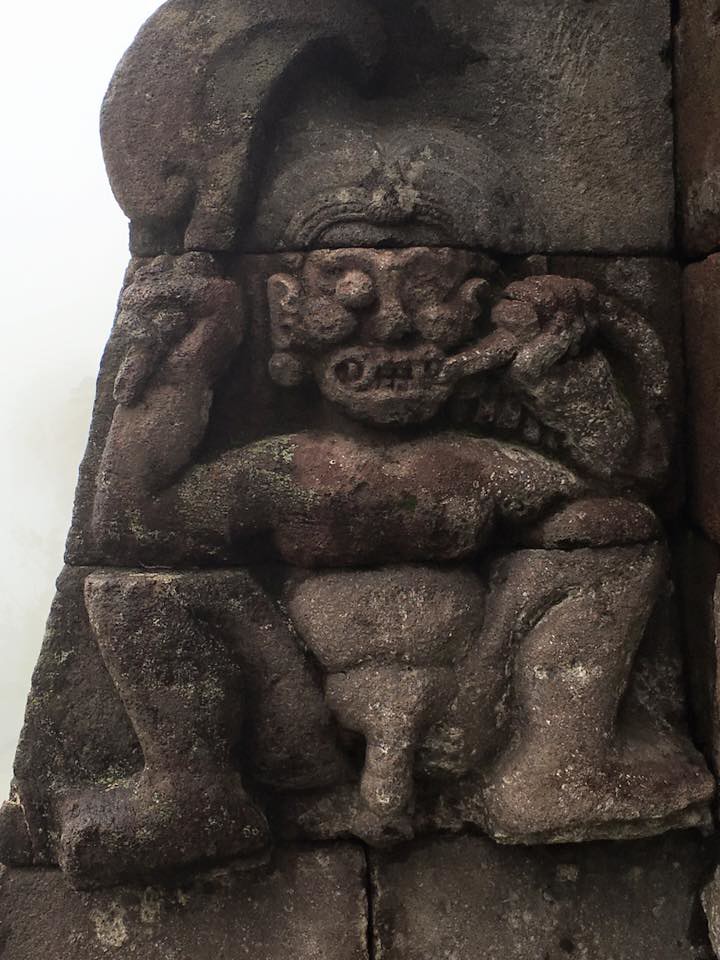
Thursday, July 21, 2016
A sunflower by another name doesn't get any attention...yet
If you read New Bloom, and I hope you do, you might be one of the only people in Taiwan who knew about the workers' hunger strike in front of the Legislative Yuan these past two days. The workers held the strike to protest the DPP government's intent to cut the number of public holidays from 19 to 12 and, for all intents and purposes, legislate away the 2-day weekend that Taiwanese workers fought hard for not that long ago.
Considering that the DPP rose to power in part on a promise to be more considerate of labor interests rather than blindly sucking corporate dick like the KMT (is it too early to say I miss the unholy triad of gangsters, property developers/big business and politicians that defined pretty much every stretch of KMT rule the country has known? Do the DPP have their own gangster-businessman handjobs to give?), this is basically a slap in the face of workers. I cannot imagine the DPP will be treated kindly at the polls if this legislation passes as-is. It also has me taking seriously the idea that the DPP is a far more conservative government than we'd thought they'd be, mirroring the KMT in ways that society never wanted them to.
What's more, despite the NPP vowing to fight for labor rights, they didn't seem to take much of an interest in the hunger strike either. I have my own issues with the NPP not caring about all labor in Taiwan (they certainly don't care about foreign labor, and no I will not shut up about it as that affects people I know directly and keeps me from fully supporting the NPP), and this is additionally worrying. What are they fighting for if not this?
Well, anyway, the strike ended with nothing achieved. While some labor protests gain social support (see the China Airlines strike just recently), this one lay flaccid and ignored. As New Bloom noted, activists largely did not seem to notice, and those who did seemed supportive but didn't necessarily show up in big enough numbers.
My theory as to why: China Airlines' staff striking meant major inconvenience for travelers and business alike (and not just the airlines' own business). They not only blocked up Nanjing Road, but managed to shut down a fair amount of air traffic. Of course that was going to be more electrifying. Sitting outside the Legislative Yuan, where you affect precisely no one who isn't used to this sort of thing, is simply not going to be as effective. Smarter would be to organize and threaten nationwide strikes on the holidays this new legislation would cut were it to go into effect.
But here's the thing: the government still ignores this at its own peril. The students and associated supporting activists do too. Also, the media. And possibly you.
If you don't remember how the Sunflower movement gained momentum, go ahead and read J. Michael Cole's Black Island: from the Next Media acquisition to anti-nuclear protests to Yuanli to Dapu to Huaguang to Losheng to the Wang residence, the Sunflowers didn't just appear on the scene, suddenly inspired as they never had been before to shut down the legislature. (Note: a lot of what I'm going to say about them is partly from my own experience and partly from re-reading about that time in recent Taiwanese history through that book. Credit where credit is due).
They fought many small, often unnoticed battles and usually lost. The Dapu homes are gone. Huaguang is gone. People didn't pay attention to them as the DPP held opposition rallies that attracted lots of people and achieved nothing, and then one day the momentum everyone had been ignoring on the sidelines (or calling "naive" and "irrational" though it was anything but) exploded in a wildly successful social movement that has quite possibly changed the future of the country.
Side note: notice how I call Taiwan a "country" and aggressively do not call it an "island" although it is one. "Island" is very common in English-language media reporting on Taiwan, but it's a cop-out, a way of being technically correct without having any nuts whatsoever. Taiwan is a country. CALL IT ONE, for chrissakes. Or are my nuts bigger than yours?
| This image is "extra large", LIKE MY NUTS. Anyway, image stolen (sorry, but my nuts need to be seen) from here Also, I do not recommend you Google "my nuts" to find this image. |
Anyway, those who were surprised were not paying attention. That's on them.
As I see it, it's starting again, but this time with workers. They might lose this fight, and the next one, and the one after that. Their hunger strikes may go unremarked-upon, and the parties that came to power promising to work with them may betray them. But, like the students, they have all of the markers of becoming the next thing that shakes the country.
First, they are right. No question. Fuck the Man. Seize the means of production. All that great stuff. Taiwanese workers are overworked and they are underpaid, and business assholes have been exploiting them for far too long. This has to change.
They are not afraid to strike, and have been inspired recently by the China Airlines strike and the successes it brought. Hopefully, they'll learn from that and conduct more successful strikes in the future.
Worker strikes, if done well, have the potential to really inconvenience a lot of people - rather like occupying the Legislative Yuan but being so peaceful and reasonable that the police don't dare to use force (which they shouldn't). Remember, you need workers to do things. All things. Like literally all of the things. If you like things getting done, you need workers. If workers refuse to work on a large scale, or in very targeted ways at very targeted times, that is going to suck for everyone. This is a good thing. It's actually an advantage the students did not have.
Though this particular protest went unnoticed, like the early student activist protests that predated the Sunflowers, there is a lot of potential there for broad public support, especially against the well-defined demon of Business Assholes. It's true that they have a lot of Business Asshole enemies and some Stockholm Syndrome types (I wonder if my good buddy who is heretofore banned from commenting will pop up and be one of these! You won't see his comments because I won't publish them, but hey buddy! Stay angry. It's fun. Never change) will complain about the inconvenience rather than consider the reasons for such drastic action, but that we know who the enemy is and most Taiwanese suffer under the current worker-business status quo means the potential is there to get the country mobilized behind them (and vote for...who? I don't know. When the KMT and DPP both fail you and the NPP is not doing as well as you'd like, who do you vote for?).
This looks like it's going to be one of those long fights - Business Assholes don't give up easily. What this means is lots and lots of protests that end up training the workers who want better conditions to engage in civil revolt more effectively, much as the activists who became the Sunflowers learned a lot from the protests that helped the movement coalesce. You are going to see workers going after what they want far more effectively - I'd put money on it. If I had a lot of money, which I don't, because teaching English at a professional level in Taiwan does not pay well. (Again a note: that's not a complaint about my various current employers. It's a complaint about the state of ESL education in Taiwan and the world in general).
Regarding that last point, the workers also have the benefit of coalescing, clarifying their message and engaging in more effective civil disobedience while the rest of the country is mostly ignoring them. Their mistakes won't be particularly public. I noticed that the student leaders were incredibly well-versed in the history of effective nonviolent civil disobedience. Someone for sure has read up on their King and their Gandhi. I can only hope the workers have leaders who are well-read in the history of labor movements and what has worked.
Finally and perhaps most importantly, they are persistent, because they really believe in what they are fighting for, and the conditions they are fighting against are truly untenable and have been going on for far too long. It is reaching a tipping point. Taiwanese actually drop dead from overwork on a startling basis, and almost everyone - even if they pretend otherwise - know that the work is far too grueling hours-wise and far too low-paid to be something Taiwanese give up and settle for. The idea that this is just going to go away is nonsense. It's not, because there is no option to give up. The consolation prize - a continued shitty work life and not even earning good money for it - is not acceptable. So they are not going to stop pushing.
And when you won't stop pushing because losing is not an option, you tend to break through and succeed, jumping over so many proverbial fences and storming so many proverbial legislatures eventually.
I do hope people start to pay attention. The youth movement needs to pay attention, certainly - even those who are still in school are going to be entering the Taiwanese working world soon. Anyway, they care about the future of the country - so not only will these workers be them soon enough, it would be a very unfortunate thing indeed if they missed where the next big movement was coming from and did not contribute their own experience, followers and support to this very important issue.
Business Assholes need to pay attention because otherwise they are going to be shocked when they wake up one day and find they can't grind Taiwanese down to nubs day after day for circus peanut pay.
Foreigners need to pay attention, because we need to fight for better labor rights, protections and immigration rights too. Foreigners not in Taiwan need to pay attention, because all your semiconductors are belong to us.
Everyday people need to pay attention, because life is eventually going to start to get difficult for them.
And the media needs to pay attention, or they are going to be as caught off-guard as they were by the Sunflowers. Something tells me that this is exactly what is going to happen, though, because the Taiwanese media.
I don't know what they will be called - which flower or berry or something entirely new - perhaps the White Orchids, because as much as you mistreat an orchid it stubbornly blooms? - but they are coming, and you'd best wake up.
Wednesday, July 20, 2016
A Light is Left On
I cut this off the bottom of my last post to give it its own post, because I felt it was buried under my apologies to the fragile glass hearts of China.
So, on a serious note, I had started a post in which I wrote about how China's motivations for aggressiveness in theSouth China Sea didn't worry me, and the actual apologies issues by many Taiwanese pop stars didn't either (the smartest comment regarding that was made by Lin Fei-fan recently, whose post you can read here - the gist as my crappy Chinese understands it is that we shouldn't blame individual artists who feel forced for economic reasons or by their agencies and promoters to apologize for having done nothing wrong, but rather to change the way we support the arts in Taiwan so that such artists can find a local base and local support, in terms of popularity and financing).
What worries me is that China is frighteningly successful at slowly building - training, even - a sense of blind nationalist fervor. An entire army, one billion or so strong (or close enough to seem like it), of trolls both self-aware and not-, of useful idiots and of economic intimidation that is scarily good at humiliating and subjugating anyone and everyone they wish to. This, I was (and am) afraid is a far more terrifying prospect than missiles and soldiers. Those are not only unlikely to be deployed in the near term, but easily make China look like the aggressor internationally. Far more horrifying is this sort of thing, where you can't quite pin it definitively on the Chinese government doucheparrots, but you know they're involved in it somehow. You can't quite get the egg to stick to their face as they humiliate your stars internationally and make you look weak. It might not bring nations to their knees but it is fantastically undercutting and detrimental to national morale.
It is especially frightening in a world where Taiwan rarely makes international news for anything other than business, or if it does it's relegated to a side note in a story that uses China as its lede. How can you fight back when nobody is listening to you?
I feel slightly differently now. With this simple contest, which has made global headlines in multiple languages (well, at least Chinese and English) and shown the world that Taiwanese can and will fight back and they will do so with two of the most potent weapons known to public discourse - satire and sarcasm - well, that gives me some hope. Far from being 'childish' or 'meaningless', there is a reason why humor is so strictly policed by authoritarian regimes. In political rhetoric, it is approaching a nuclear option. This entire contest is a brilliant show of social media savvy - if you grab international headlines, you are pretty damn savvy - as well as the sharp level of satire and sarcasm that Taiwanese regularly employ.
Missiles and soldiers? Scary. But the death of intelligent discourse? Way scarier. As long as you keep talking about things, as long as you keep exchanging ideas and progressing in understanding of issues through rhetoric and discussion, as long as you don't stop fighting and don't shut your mouth, a light is left on somewhere even in the darkest times. When that light is quashed by a billion angry trolls so you can't hear other free-minded people above the static and din, you've got far bigger problems than you might think.
Side note: if you are one of those idiot Westerners who think 'Asians don't understand sarcasm', you are simply wrong and this proves you wrong. You may now go back to drinking beer in your dank expat cave and generally ceasing to comment on things you don't understand because you don't have local friends. BYE.
If Taiwan can keep this up - fighting attempted humiliation with biting wit - they'll have half a chance in the media battle for the attention of the world. And China will be exactly what it deserves: well and truly fucked.
So, on a serious note, I had started a post in which I wrote about how China's motivations for aggressiveness in theSouth China Sea didn't worry me, and the actual apologies issues by many Taiwanese pop stars didn't either (the smartest comment regarding that was made by Lin Fei-fan recently, whose post you can read here - the gist as my crappy Chinese understands it is that we shouldn't blame individual artists who feel forced for economic reasons or by their agencies and promoters to apologize for having done nothing wrong, but rather to change the way we support the arts in Taiwan so that such artists can find a local base and local support, in terms of popularity and financing).
What worries me is that China is frighteningly successful at slowly building - training, even - a sense of blind nationalist fervor. An entire army, one billion or so strong (or close enough to seem like it), of trolls both self-aware and not-, of useful idiots and of economic intimidation that is scarily good at humiliating and subjugating anyone and everyone they wish to. This, I was (and am) afraid is a far more terrifying prospect than missiles and soldiers. Those are not only unlikely to be deployed in the near term, but easily make China look like the aggressor internationally. Far more horrifying is this sort of thing, where you can't quite pin it definitively on the Chinese government doucheparrots, but you know they're involved in it somehow. You can't quite get the egg to stick to their face as they humiliate your stars internationally and make you look weak. It might not bring nations to their knees but it is fantastically undercutting and detrimental to national morale.
It is especially frightening in a world where Taiwan rarely makes international news for anything other than business, or if it does it's relegated to a side note in a story that uses China as its lede. How can you fight back when nobody is listening to you?
I feel slightly differently now. With this simple contest, which has made global headlines in multiple languages (well, at least Chinese and English) and shown the world that Taiwanese can and will fight back and they will do so with two of the most potent weapons known to public discourse - satire and sarcasm - well, that gives me some hope. Far from being 'childish' or 'meaningless', there is a reason why humor is so strictly policed by authoritarian regimes. In political rhetoric, it is approaching a nuclear option. This entire contest is a brilliant show of social media savvy - if you grab international headlines, you are pretty damn savvy - as well as the sharp level of satire and sarcasm that Taiwanese regularly employ.
Missiles and soldiers? Scary. But the death of intelligent discourse? Way scarier. As long as you keep talking about things, as long as you keep exchanging ideas and progressing in understanding of issues through rhetoric and discussion, as long as you don't stop fighting and don't shut your mouth, a light is left on somewhere even in the darkest times. When that light is quashed by a billion angry trolls so you can't hear other free-minded people above the static and din, you've got far bigger problems than you might think.
Side note: if you are one of those idiot Westerners who think 'Asians don't understand sarcasm', you are simply wrong and this proves you wrong. You may now go back to drinking beer in your dank expat cave and generally ceasing to comment on things you don't understand because you don't have local friends. BYE.
If Taiwan can keep this up - fighting attempted humiliation with biting wit - they'll have half a chance in the media battle for the attention of the world. And China will be exactly what it deserves: well and truly fucked.
Tuesday, July 19, 2016
My deepest apologies to the People's Republic of China and their 5,000 years of culture
Update:
I may make fun of the Chinese government, and it is certainly well-deserved, but I am really very sorry to hear about the bus fire that killed at least 26 in Taiwan including 24 Chinese. It's important to remember that as much as we may make fun of public discourse or terrible leaders, that it is never okay to make light of real, individual human lives. I really am saddened by this, and extend condolences to the families affected.
In solidarity with the artists and entertainers who have been forced recently to apologize to the People's Republic of China for being so, so wrong and unforgivably arrogant as to have views that differ from those that the Chinese government and its phalanx of paid Internet trolls, I would like to express my most sincere and heartfelt apologies to the People's Republic of China and their eminently competent, reasonable leaders. This includes the Chinese people of Chinese Taipei, Chinese South China Sea and the Chinese Moon which has been Chinese since antiquity.
I have many things to apologize for. For example, I am deeply sorry that I live in a society that treats women better than your society does, and one in which laws regarding women's rights are superior. For example:
I must also apologize for the embarrassing situation in which, on a daily basis, I breathe cleaner air than 1.7 billion Chinese people. A big nose foreigner such as myself has no right to breathe healthier air than the great and superior Chinese race of China, a country where everyone is exactly the same race (Chinese) with no deviations.
I apologize that I only speak one dialect of the Chinese language, and have only basic proficiency in another. I understand that there are many dialects to this one singular language and it is my weaker, less intelligent, nearly ape-like foreign monster brain that has made it impossible for me to also comprehend the entirety of the Chinese language, including Cantonese, Shanghainese, Sichuanese, Uighur, Tibetan, Miao and Dong. If I were Chinese with a superior intellect I would be able to instantly understand all of these languages as they are closely related, mutually intelligible and in fact inseparable under the rubric of "the Chinese language". I am a lazy and incompetent student as I have only learned the Mandarin aspect of the Chinese language, and I deeply regret that my scholarship is lacking.
I am deeply remorseful for living in a free society in which I can express my views freely in written and spoken form, criticize political leaders, participate in protests if I so choose and generally enjoy the protections of basic human rights and the rule of law. I am very sorry, furthermore, that I prefer living such a materialistic Western running dog lifestyle to...not doing that.
I am very sorry that, while that gaggle of pre-intermediate buttclowns in the Communist Party of China talks of China's progress in gender equality, that marital rape is illegal in Taiwan but is not considered 'rape' in China. My most heartfelt apologies for finding this utterly barbaric and unacceptable.
I am also sorry that I have not sufficiently supported Chinese efforts to reclaim its ancestral territory in Canada, the North Pole, the Solar System and the Andromeda Galaxy. I understand that these are sacred and inalienable parts of China since antiquity and reflect with perfect accuracy the historical borders of China during its earliest dynasties before the Big Bang.
I realize that my Western capitalist dissolute ways and immoral, irrational viewpoints are unacceptable to the fragile, sensitive hearts of the People's Republic of China - hearts which beat as one with national pride and glory - and I would like to express my most considerate and long-meditated-upon contrition for immorally and irrationally daring to criticize the united wishes of over one billion superior Chinese with my illogical, China-hating ways. I fully accept that I can never understand China's 5,000,000,000,000,000,000,000,000,000,0000000,00,000,0,0,0,,,,000000,0 years of culture nor can anyone who was not born of the superior Chinese race, which is Han Chinese, but also everyone else in China, although they are inferior to the Han as well as superior to everyone else because they are inalienably Chinese.
Finally, I would like to apologize for the fact that 習近平的菊花茶 is so bitter, but Chinese must drink it every day.
* * *
On a serious note, I had started a post in which I wrote about how China's motivations for aggressiveness in the South China Sea didn't worry me, and the actual apologies issues by many Taiwanese pop stars didn't either (the smartest comment regarding that was made by Lin Fei-fan recently, whose post you can read here - the gist as my crappy Chinese understands it is that we shouldn't blame individual artists who feel forced for economic reasons or by their agencies and promoters to apologize for having done nothing wrong, but rather to change the way we support the arts in Taiwan so that such artists can find a local base and local support, in terms of popularity and financing).
What worries me is that China is frighteningly successful at slowly building - training, even - a sense of blind nationalist fervor. An entire army, one billion or so strong (or close enough to seem like it), of trolls both self-aware and not-, of useful idiots and of economic intimidation that is scarily good at humiliating and subjugating anyone and everyone they wish to. This, I was (and am) afraid is a far more terrifying prospect than missiles and soldiers. Those are not only unlikely to be deployed in the near term, but easily make China look like the aggressor internationally. Far more horrifying is this sort of thing, where you can't quite pin it definitively on the Chinese government doucheparrots, but you know they're involved in it somehow. You can't quite get the egg to stick to their face as they humiliate your stars internationally and make you look weak. It might not bring nations to their knees but it is fantastically undercutting and detrimental to national morale.
It is especially frightening in a world where Taiwan rarely makes international news for anything other than business, or if it does it's relegated to a side note in a story that uses China as its lede. How can you fight back when nobody is listening to you?
I feel slightly differently now. With this simple contest, which has made global headlines in multiple languages (well, at least Chinese and English) and shown the world that Taiwanese can and will fight back and they will do so with two of the most potent weapons known to public discourse - satire and sarcasm - well, that gives me some hope. Far from being 'childish' or 'meaningless', there is a reason why humor is so strictly policed by authoritarian regimes. In political rhetoric, it is approaching a nuclear option. This entire contest is a brilliant show of social media savvy - if you grab international headlines, you are pretty damn savvy - as well as the sharp level of satire and sarcasm that Taiwanese regularly employ.
Missiles and soldiers? Scary. But the death of intelligent discourse? Way scarier. As long as you keep talking about things, as long as you keep exchanging ideas and progressing in understanding of issues through rhetoric and discussion, as long as you don't stop fighting and don't shut your mouth, a light is left on somewhere even in the darkest times. When that light is quashed by a billion angry trolls so you can't hear other free-minded people above the static and din, you've got far bigger problems than you might think.
Side note: if you are one of those idiot Westerners who think 'Asians don't understand sarcasm', you are simply wrong and this proves you wrong. You may now go back to drinking beer in your dank expat cave and generally ceasing to comment on things you don't understand because you don't have local friends. BYE).
If Taiwan can keep this up - fighting attempted humiliation with biting wit - they'll have half a chance in the media battle for the attention of the world. And China will be exactly what it deserves: well and truly fucked.
Update #2: I'm moving the text from here to a new post as it will likely get lost amid all of my sincere apologies to the fragile hearts and minds of the leaders of the People's Republic of China and their Internet troll army.
I may make fun of the Chinese government, and it is certainly well-deserved, but I am really very sorry to hear about the bus fire that killed at least 26 in Taiwan including 24 Chinese. It's important to remember that as much as we may make fun of public discourse or terrible leaders, that it is never okay to make light of real, individual human lives. I really am saddened by this, and extend condolences to the families affected.
In solidarity with the artists and entertainers who have been forced recently to apologize to the People's Republic of China for being so, so wrong and unforgivably arrogant as to have views that differ from those that the Chinese government and its phalanx of paid Internet trolls, I would like to express my most sincere and heartfelt apologies to the People's Republic of China and their eminently competent, reasonable leaders. This includes the Chinese people of Chinese Taipei, Chinese South China Sea and the Chinese Moon which has been Chinese since antiquity.
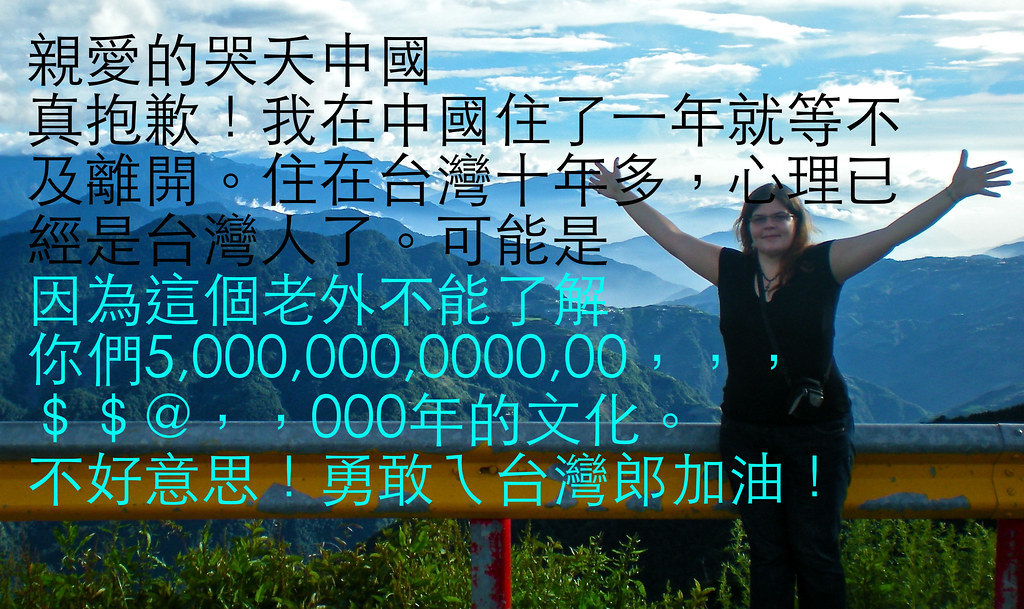 |
| Photo created by me, originally posted here (you can go ahead and like it if you want, but don't feel obligated) |
I have many things to apologize for. For example, I am deeply sorry that I live in a society that treats women better than your society does, and one in which laws regarding women's rights are superior. For example:
I must also apologize for the embarrassing situation in which, on a daily basis, I breathe cleaner air than 1.7 billion Chinese people. A big nose foreigner such as myself has no right to breathe healthier air than the great and superior Chinese race of China, a country where everyone is exactly the same race (Chinese) with no deviations.
I apologize that I only speak one dialect of the Chinese language, and have only basic proficiency in another. I understand that there are many dialects to this one singular language and it is my weaker, less intelligent, nearly ape-like foreign monster brain that has made it impossible for me to also comprehend the entirety of the Chinese language, including Cantonese, Shanghainese, Sichuanese, Uighur, Tibetan, Miao and Dong. If I were Chinese with a superior intellect I would be able to instantly understand all of these languages as they are closely related, mutually intelligible and in fact inseparable under the rubric of "the Chinese language". I am a lazy and incompetent student as I have only learned the Mandarin aspect of the Chinese language, and I deeply regret that my scholarship is lacking.
I am deeply remorseful for living in a free society in which I can express my views freely in written and spoken form, criticize political leaders, participate in protests if I so choose and generally enjoy the protections of basic human rights and the rule of law. I am very sorry, furthermore, that I prefer living such a materialistic Western running dog lifestyle to...not doing that.
I am very sorry that, while that gaggle of pre-intermediate buttclowns in the Communist Party of China talks of China's progress in gender equality, that marital rape is illegal in Taiwan but is not considered 'rape' in China. My most heartfelt apologies for finding this utterly barbaric and unacceptable.
I am also sorry that I have not sufficiently supported Chinese efforts to reclaim its ancestral territory in Canada, the North Pole, the Solar System and the Andromeda Galaxy. I understand that these are sacred and inalienable parts of China since antiquity and reflect with perfect accuracy the historical borders of China during its earliest dynasties before the Big Bang.
I realize that my Western capitalist dissolute ways and immoral, irrational viewpoints are unacceptable to the fragile, sensitive hearts of the People's Republic of China - hearts which beat as one with national pride and glory - and I would like to express my most considerate and long-meditated-upon contrition for immorally and irrationally daring to criticize the united wishes of over one billion superior Chinese with my illogical, China-hating ways. I fully accept that I can never understand China's 5,000,000,000,000,000,000,000,000,000,0000000,00,000,0,0,0,,,,000000,0 years of culture nor can anyone who was not born of the superior Chinese race, which is Han Chinese, but also everyone else in China, although they are inferior to the Han as well as superior to everyone else because they are inalienably Chinese.
Finally, I would like to apologize for the fact that 習近平的菊花茶 is so bitter, but Chinese must drink it every day.
* * *
On a serious note, I had started a post in which I wrote about how China's motivations for aggressiveness in the South China Sea didn't worry me, and the actual apologies issues by many Taiwanese pop stars didn't either (the smartest comment regarding that was made by Lin Fei-fan recently, whose post you can read here - the gist as my crappy Chinese understands it is that we shouldn't blame individual artists who feel forced for economic reasons or by their agencies and promoters to apologize for having done nothing wrong, but rather to change the way we support the arts in Taiwan so that such artists can find a local base and local support, in terms of popularity and financing).
What worries me is that China is frighteningly successful at slowly building - training, even - a sense of blind nationalist fervor. An entire army, one billion or so strong (or close enough to seem like it), of trolls both self-aware and not-, of useful idiots and of economic intimidation that is scarily good at humiliating and subjugating anyone and everyone they wish to. This, I was (and am) afraid is a far more terrifying prospect than missiles and soldiers. Those are not only unlikely to be deployed in the near term, but easily make China look like the aggressor internationally. Far more horrifying is this sort of thing, where you can't quite pin it definitively on the Chinese government doucheparrots, but you know they're involved in it somehow. You can't quite get the egg to stick to their face as they humiliate your stars internationally and make you look weak. It might not bring nations to their knees but it is fantastically undercutting and detrimental to national morale.
It is especially frightening in a world where Taiwan rarely makes international news for anything other than business, or if it does it's relegated to a side note in a story that uses China as its lede. How can you fight back when nobody is listening to you?
I feel slightly differently now. With this simple contest, which has made global headlines in multiple languages (well, at least Chinese and English) and shown the world that Taiwanese can and will fight back and they will do so with two of the most potent weapons known to public discourse - satire and sarcasm - well, that gives me some hope. Far from being 'childish' or 'meaningless', there is a reason why humor is so strictly policed by authoritarian regimes. In political rhetoric, it is approaching a nuclear option. This entire contest is a brilliant show of social media savvy - if you grab international headlines, you are pretty damn savvy - as well as the sharp level of satire and sarcasm that Taiwanese regularly employ.
Missiles and soldiers? Scary. But the death of intelligent discourse? Way scarier. As long as you keep talking about things, as long as you keep exchanging ideas and progressing in understanding of issues through rhetoric and discussion, as long as you don't stop fighting and don't shut your mouth, a light is left on somewhere even in the darkest times. When that light is quashed by a billion angry trolls so you can't hear other free-minded people above the static and din, you've got far bigger problems than you might think.
Side note: if you are one of those idiot Westerners who think 'Asians don't understand sarcasm', you are simply wrong and this proves you wrong. You may now go back to drinking beer in your dank expat cave and generally ceasing to comment on things you don't understand because you don't have local friends. BYE).
If Taiwan can keep this up - fighting attempted humiliation with biting wit - they'll have half a chance in the media battle for the attention of the world. And China will be exactly what it deserves: well and truly fucked.
Update #2: I'm moving the text from here to a new post as it will likely get lost amid all of my sincere apologies to the fragile hearts and minds of the leaders of the People's Republic of China and their Internet troll army.
Monday, July 18, 2016
Taiwan is more than Taipei
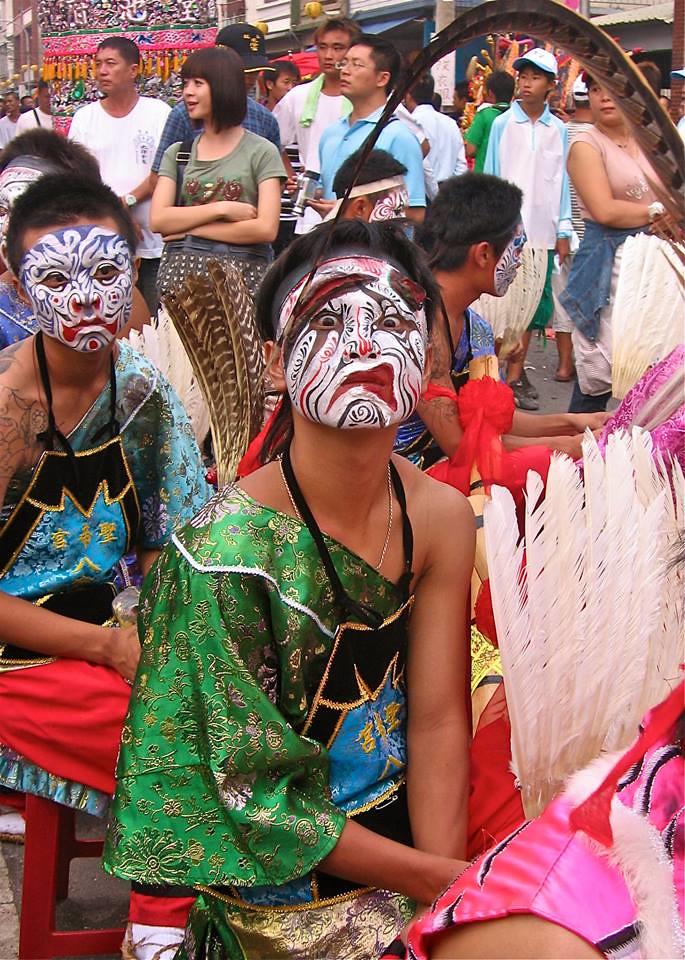 |
| "Wang Ye" in full makeup at the opening of the Donggang King Boat Festival |
Anyway, why does it always have to be hot springs, a few Taipei hot spots, maybe Sun Moon Lake and Taroko if you're lucky, and "theme restaurants"? Maybe these days Kenting will figure in on these "itineraries". I'm sick of it too. While I could recommend a few great hot springs and I've even been to that toilet restaurant (verdict: mediocre. Were you surprised?), I feel like one could do a much better job talking about great places in Taiwan than "Taipei 101 and this lake I hear about in the mountains". Not Taipei, Taiwan.
So, in no particular order and with no particular rhyme or reason, here are some of my favorite places in Taiwan. With links, mostly to my blog, because I'm nothing if not self-promoting.
This has to have been one of my favorite trips in Taiwan that was not an outlying island. The area around Gangzai and south toward the east end of Kending is gorgeous. There are people who go to Gangzai, a little strip of a town along the thin road down the coast that peters out a few kilometers to the south, just to enjoy a Taiwan without convenience stores. I actually like convenience stores, but I also appreciate the quiet rural peace of towns like this.
From here, if you have a car, you can drive around sand dunes (or just walk on the beach), drive up to some grasslands with great views of the mountains and sea, listen to waves make rain sounds on a pebble beach to the north, hike to the ruins of an aboriginal village, hike along the coast to a shipweck and be within a short drive of some of Kending's best coastal scenery and beaches. Plus, it means you can see the beauty of Kending without ever going to Kending town. Win-win, because Kending town sucks butt. Loud, crowded, dirty tourist trap with a crappy crowded beach and literally nothing to recommend it.
As a confirmed driving-hater, I can say that the driving isn't even that hard, I was okay with it.
I'll wait on a link in the heading until I blog my latest Tainan adventures, as recently I managed to visit Tainan not once, but twice in the span of a few months. However, I'd been there several times before, though not with as good photographic results.
Tainan is the city of my heart. It's where Brendan and I decided to start dating and was one of my first (successful) forays outside of Taipei when I was still fresh off the plane in 2006-2007. If I could do my job there - I can't - and it had better public transportation, or really any public transportation, I would move there.
I love it not only for the huge variety of temples of all sizes, backgrounds and ages, but also for it's laid-back urban vibe. It's a city, but not a frenetic one (I'd say "like Taipei" but I actually think Taipei is pretty laid-back too). I love it for the many varieties of ice cream and shaved ice available to cool yourself in the tropical heat, I love its "we're as hip as Taipei, or maybe even hipper" cafes and its nascent young, artsy vibe. I love eating fresh fruit ice cream in a melon at Taicheng Fruit Store and drinking coffee at Narrow Door and Taikoo. I love Tainan shrimp roll rice. I love Tainan's pro-independence politics.
I could chill in Tainan forever.
I don't have links yet as I haven't blogged our Yunlin trip, so here are some from my friend over at Synapticism. You won't find a more traditional-yet-almost-completely-uncommercialized place than Yunlin County and its assorted towns. If you want to see where your Taiwanese friends' grandparents all come from, check it out.
Yunlin is another good place to chill, without any major must-sees except, perhaps, Beigang's Chaotian temple. I liked the old-school flavor of Beigang, enjoyed the unique "old street" buildings in Xiluo, whose old street hasn't become too commercialized yet, and finding (more than one!) funky cafe in Douliu as well as a temple to both a Daoist god (I think Guan Di) and Confucius and a truly uncommercialized old street. We didn't get to stay in Huwei but I would be interested to go back - the downtown area looks bustling, with some interesting old architecture, and there's a puppet museum. You could spend about half a day in any given town - more if you are content to explore for half a day and spend the rest of it in a cafe chilling out until dinner, which I generally am - and although there may be a long wait for a bus, transit between the towns is otherwise fairly quick and easy. Downtowns are pretty compact, you only need independent transport if you want to get way out into the countryside, which is a plus.
Anyway, watch this space - I'll be doing a longer post on this very soon.
This is one of my favorite places in Taiwan. There is not that much to do in Lishan itself - though exploring the abandoned church and the old Lishan Hotel (which I understand may have been finally renovated and reopened?) will give you a reason to get out and just enjoy the views. Or, you could just walk around and enjoy the views! This is a trip you will want a car for, or some way of obtaining independent transportation. With it, you can visit Fushoushan and Wuling farms during the day, and then drink tea outside back in Lishan town as the sun sets (if you get a good honestay or hotel, that is). If you can score a ride to Fushoushan, after exploring up there it's not hard to hike back down to town and, again, the views are breathtaking. It's a fantastic place to go to just relax, with clean air and some of the most stunning mountain scenery in the country. If you're thinking "I want to hang out in the mountains, but still be able to walk to a few restaurants and places to buy essentials", Lishan is for you.
I don't have a lot of photos from the first trip, as I was more concerned with making sure Emily (who was driving) knew where she was going. So, most of those pics are from our drive the next day down the east coast. My second trip concentrated on Lalashan and Shangbaling, not the whole highway. But, the drive is lovely and in many places, wild. You end up in the same place that the Central Cross-Island drops you off if you take the Yilan route (there is also a Hualien route, which I have not done). Some of the driving, along one-car-at-a-time roads clinging to mountainsides, can be a bit intense, but it's absolutely worth it. Daxi, Fuxing and Xiao Wulai, with its lovely little waterfall and - more interestingly, hike to the lovely little waterfall - are also good places to stop. Yes, I've been to Cihu - I took my in-laws there, which I think my history buff father-in-law enjoyed - but never blogged about it.
The point? Between Daxi, Cihu, Fuxing, Xiao Wulai, Shangbaling and, at the other end, Mingchih Forest Recreation Area, you'll be pleasantly surprised by all there is to see and do along the highway. Or, just drive along and enjoy the mountain views.
Poor Puli. First the earthquake, and now it just doesn't get that much love from international tourists. If people go there at all it's to catch a bus to Sun Moon Lake. But Puli saved my butt during a particularly horrid Chinese New Year camping trip: see link above, also, don't try to camp in the mountains of Taiwan on Chinese New Year. You can thank me later for that bit of advice. For that, I will always be grateful. The Shaoxing wine brewery is interesting enough, I liked making a little paper fan at the paper factory, I still have the tray I bought at the lacquer makers', and if you're not into that sort of tourist-trail 'handicrafts and local goods' stuff, rent a bike, get out of town and enjoy the views as the Central Mountain Range rises from the plain. Also, within a short drive is the "where is that?" town of Caotun. I can't say there's that much to do in Caotun, but there is one very cool temple that looks like a medicine gourd (慈德宫) perched on a hill out of town. It's way more interesting than the - in my opinion - creepy-seeming Zhongtai monastery.
After a soporific drive through bucolic tropical beauty, with a stop to see some Formosan macaques which may or may not take over your car, you'll be greeted with Hawaii-like views of the sea as you hit the coast at Donghe. Stop for a break at the cafe above Jinzun beach (and absolutely do take the stairs down to the near-deserted beach, though I'm not sure I'd recommend swimming) but otherwise enjoy the Hawaii-Five-O drive down to Taidong. There are a few other places you can stop at on the way, including the expat enclave of Dulan. We didn't stay long, but we did pick up some locally-brewed beer for later.
Beipu has become something of a tourist stop, but Pasta'ai, if you can finagle the dates for the biennial Saisiyat aboriginal harvest festival, is still a very local thing. As long as you are respectful and friendly and willing to drink a crapton of millet wine, foreign guests are welcome. That said, it's not nearly as commercialized (or really commercialized at all) as its sister festival in Nanzhuang. Don't forget Zhang Xueliang's house and a worthwhile hike over Lion's Head Mountain. The temple on the Miaoli end gets all the press, but I actually liked the old Japanese baroque temple on the mountain itself.
Hukou is, well, an old street. But it's a quiet one, without the same-old-same-old souvenir shops that plague Sanxia, Jinshan, Shenkeng and Daxi. It's pretty far out of town and bus service is sporadic, so you will want to either drive or arrange taxis. Being folks who dislike driving, we did the latter.
Hsinchu city is also worth your time, with some interesting historical sites, good food, a city god temple and the absolutely amazing - not really in a good way - temple to late mass murderer, brutal dictator and all around asshat Chiang Kai-shek, which has got to be one of the most mind-blowing historical things I've seen in Taiwan. Not because the temple itself is particularly special, but for what it represents.
Long and short of it? There's a lot to do in Hsinchu.
I cannot believe I've been to Kaohsiung city at least three times and yet never really blogged much about the city itself. (Edit: here you go!)
That said, enjoy this post about the Batman room at the Eden Exotic Love Hotel in Kaohsiung.
Anyway, I was there for a weekend last month so I'll be fixing that soon. Yes, there are all the things you've heard about: Pier 2, wandering around Hamasen, the British Consulate at Takao (I like to go for the views, that's about it really), Cijin Island, Chaishan and its monkeys, Lotus Lake, Love River, the sugar refinery (which is now a family-friendly tourist spot), Liuhe Night Market. With the exception of the night market, all of this stuff is fine - well, the sugar refinery was a bit bland - and I enjoy it too. By all means, go. Especially Cijin Island, which has great seafood and a fun ferry ride to get you there. I am also a fan of the Dome of Light in Formosa Boulevard station, and in a hallway just off of it, a man who makes sterling silver flower pendants, rings and other charms.
But I like Kaohsiung for its great coffee and food scene, including some fantastic hangouts like Beast (try the sweet potato and cheese quesadillas and Cambridge Cucumber 'mojito'), Reve Coffee and Sojourner Cafe, great burgers at Zzyzx, Takao Beer, a particular cafe on Chaishan that I enjoy, and tons of great local food. I like that it has an MRT so I don't have to taxi everywhere, as I won't rent a car in such a large city. I like Ruifeng Night Market, crowded with locals but almost unknown to tourists. I like hanging out with my friend Sasha in Dashe and eating a whole chicken, gorgeously cooked before walking up Guanyin Mountain.
I'm including Donggang in here because it's a perfect day trip from Kaohsiung. I haven't been to the nearby aquarium, but I can heartily recommend dinner at the harbor (best seafood in Taiwan without going to the outlying islands), Donglong Temple and its magnificent golden gate, a quick walk down the old street, and - again if you can figure out the dates - its King Boat Festival, held every three years, which is worth visiting both at the beginning and the end. Quite possibly the best cultural festival in Taiwan. I wrote my first ever published nonfiction story about it, and you should definitely buy the anthology in which it appears.
Another good choice near Kaohsiung? Meinong. Pretty on-the-tourist-trail, but nice.
...including Yuemeikeng in Jiaoxi (I couldn't make this a favorite considering what happened the second time we went).
There are several hiking trails up here - Yuemeikeng, Caoling Old Trail, Wankengtou and the Taoyuan grasslands (accessible from Caoling Old Trail), and Paoma (Running Horse) Old Trail to name a few. The views? Spectacular. Ever wondered what it was like to walk along a ridge of seaside cliffs with rolling hills to one side and a sheer drop to the waves below at the other? Well, this is it. Probably my biggest "don't miss" set of hiking trails in the entire country.
No, really, I love hanging out in Keelung. From Heping Island to Miaokou Night Market to the Fairy Cave Temple to Ghost Month, I always enjoy a reason to pass through this - to be honest - kinda grotty town. It's still got the old red light district "welcome sailors!" feeling, it's a bit rough around the edges (okay, at times very rough around the edges) and packed with pachinko parlors, but that's what makes it interesting.
Also, a great stopping-off point from trips to Jiufen and Jinguashi (which are nice, but packed with tourists - for good reason) and my favorite hot springs in Jinshan (in the old Japanese governor-general's hot spring getaway on the coast). Also, a good place to eat after a half day hike up Xiaotzukeng to Jiufen.
I don't think I have to sell you on Orchid Island (Lanyu) but I'll try anyway. Lanyu is unlike anywhere else in Taiwan. The locals don't put much stock in a cash economy - in that I saw locals freely using the services of their neighbors' businesses without paying because it all comes back eventually - though as an outsider you'll have to pay. Where kids run around and are supervised by whomever happens to be nearby, including when they run into the ocean. Where people paint traditional fishing boats by the side of the road. The language sounds more like an offshoot of Tagalog than anything you'll hear on Taiwan's mainland. It's one of the few places in Taiwan where you can speak Chinese to locals, but it will feel most definitely like two non-native speakers communicating. It's a place where you can completely and utterly chill out, a tiny (but sadly beachless) Hawaii with good snorkeling and out-of-this-world seafood (try the flying fish barbecue with a pitcher of ice cold Taiwan Beer). It's easy to drive or scooter around as there is one road (two if you count the one that runs up the middle of the island and connects at two different ends of the circle road).
I don't mean to exoticize it that much, I just want to make really clear that Orchid Island is not only nothing like anything you'll find elsewhere, it's also nothing like you'll find in Taiwan proper. It is unique. Don't miss it.
Being hard to get to due to near-constant fog that tends to ground flights, and its relative distance from Taiwan, most tourists give Matsu a miss. This is a mistake. I don't know what I was doing with my life before I discovered lao jiu mian (thin noodles with seafood cooked in a broth flavored with aged local wine). "Juguang Hamburgers", a sort of sesame-covered bread filled with a seafood filling that appears to be mainly chopped oyster remains one of my favorite foods. The old stone villages and winding paths through granite cliffs and dry, but humid coastlines evokes the Greek Isles or Turkey (in fact the houses reminded me very strongly of older settlements in Turkey). We stayed in Taiwan and yet felt like we'd taken a foreign vacation.
I love the old Ding family home (丁家老宅) with its coffee shop in a side hall. I love the old buildings on Zhongshan Road. I love the old street and its cafes in restored houses. I love the festivals at the Matsu temple. I love the old Longshan Temple at the other end of town. I love fried oysters. Hate me if you must, but I love Lugang and I am not afraid to admit it.
Southeast Pingdong County and East of Kending
This has to have been one of my favorite trips in Taiwan that was not an outlying island. The area around Gangzai and south toward the east end of Kending is gorgeous. There are people who go to Gangzai, a little strip of a town along the thin road down the coast that peters out a few kilometers to the south, just to enjoy a Taiwan without convenience stores. I actually like convenience stores, but I also appreciate the quiet rural peace of towns like this.
From here, if you have a car, you can drive around sand dunes (or just walk on the beach), drive up to some grasslands with great views of the mountains and sea, listen to waves make rain sounds on a pebble beach to the north, hike to the ruins of an aboriginal village, hike along the coast to a shipweck and be within a short drive of some of Kending's best coastal scenery and beaches. Plus, it means you can see the beauty of Kending without ever going to Kending town. Win-win, because Kending town sucks butt. Loud, crowded, dirty tourist trap with a crappy crowded beach and literally nothing to recommend it.
As a confirmed driving-hater, I can say that the driving isn't even that hard, I was okay with it.
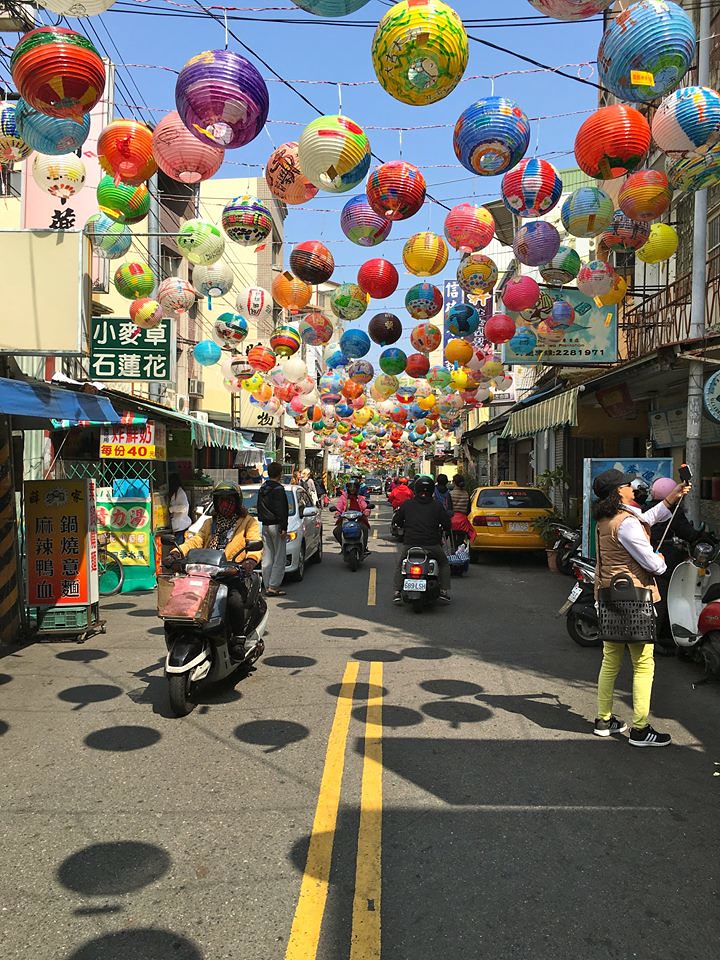 |
| Downtown Tainan |
Tainan is the city of my heart. It's where Brendan and I decided to start dating and was one of my first (successful) forays outside of Taipei when I was still fresh off the plane in 2006-2007. If I could do my job there - I can't - and it had better public transportation, or really any public transportation, I would move there.
I love it not only for the huge variety of temples of all sizes, backgrounds and ages, but also for it's laid-back urban vibe. It's a city, but not a frenetic one (I'd say "like Taipei" but I actually think Taipei is pretty laid-back too). I love it for the many varieties of ice cream and shaved ice available to cool yourself in the tropical heat, I love its "we're as hip as Taipei, or maybe even hipper" cafes and its nascent young, artsy vibe. I love eating fresh fruit ice cream in a melon at Taicheng Fruit Store and drinking coffee at Narrow Door and Taikoo. I love Tainan shrimp roll rice. I love Tainan's pro-independence politics.
I could chill in Tainan forever.
Yunlin County
I don't have links yet as I haven't blogged our Yunlin trip, so here are some from my friend over at Synapticism. You won't find a more traditional-yet-almost-completely-uncommercialized place than Yunlin County and its assorted towns. If you want to see where your Taiwanese friends' grandparents all come from, check it out.
Yunlin is another good place to chill, without any major must-sees except, perhaps, Beigang's Chaotian temple. I liked the old-school flavor of Beigang, enjoyed the unique "old street" buildings in Xiluo, whose old street hasn't become too commercialized yet, and finding (more than one!) funky cafe in Douliu as well as a temple to both a Daoist god (I think Guan Di) and Confucius and a truly uncommercialized old street. We didn't get to stay in Huwei but I would be interested to go back - the downtown area looks bustling, with some interesting old architecture, and there's a puppet museum. You could spend about half a day in any given town - more if you are content to explore for half a day and spend the rest of it in a cafe chilling out until dinner, which I generally am - and although there may be a long wait for a bus, transit between the towns is otherwise fairly quick and easy. Downtowns are pretty compact, you only need independent transport if you want to get way out into the countryside, which is a plus.
Anyway, watch this space - I'll be doing a longer post on this very soon.
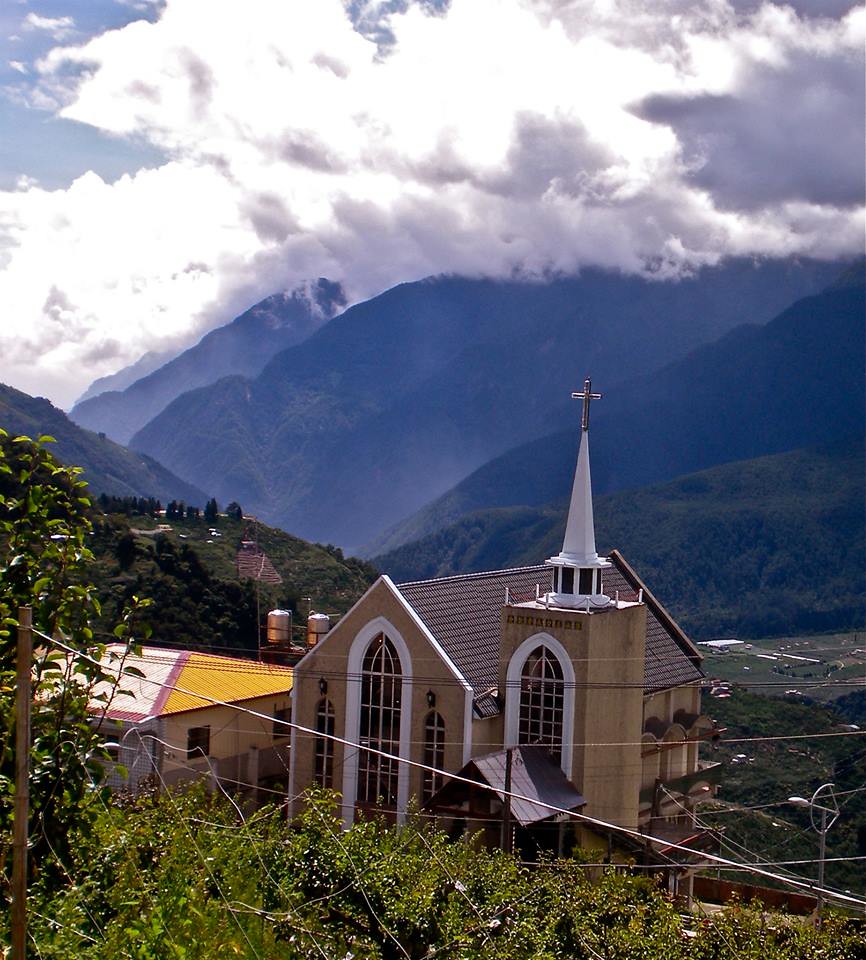 |
| The abandoned church in Lishan |
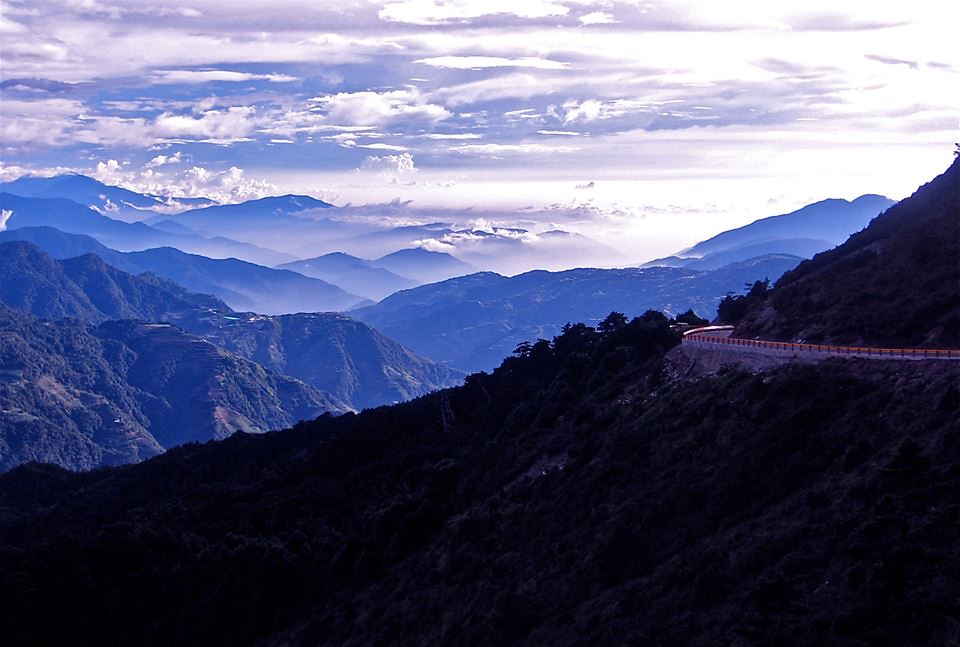 |
| The drive to Lishan from Hehuan Mountain |
In fact, the North Cross-Island is pretty rad, too
I don't have a lot of photos from the first trip, as I was more concerned with making sure Emily (who was driving) knew where she was going. So, most of those pics are from our drive the next day down the east coast. My second trip concentrated on Lalashan and Shangbaling, not the whole highway. But, the drive is lovely and in many places, wild. You end up in the same place that the Central Cross-Island drops you off if you take the Yilan route (there is also a Hualien route, which I have not done). Some of the driving, along one-car-at-a-time roads clinging to mountainsides, can be a bit intense, but it's absolutely worth it. Daxi, Fuxing and Xiao Wulai, with its lovely little waterfall and - more interestingly, hike to the lovely little waterfall - are also good places to stop. Yes, I've been to Cihu - I took my in-laws there, which I think my history buff father-in-law enjoyed - but never blogged about it.
The point? Between Daxi, Cihu, Fuxing, Xiao Wulai, Shangbaling and, at the other end, Mingchih Forest Recreation Area, you'll be pleasantly surprised by all there is to see and do along the highway. Or, just drive along and enjoy the mountain views.
Puli
Poor Puli. First the earthquake, and now it just doesn't get that much love from international tourists. If people go there at all it's to catch a bus to Sun Moon Lake. But Puli saved my butt during a particularly horrid Chinese New Year camping trip: see link above, also, don't try to camp in the mountains of Taiwan on Chinese New Year. You can thank me later for that bit of advice. For that, I will always be grateful. The Shaoxing wine brewery is interesting enough, I liked making a little paper fan at the paper factory, I still have the tray I bought at the lacquer makers', and if you're not into that sort of tourist-trail 'handicrafts and local goods' stuff, rent a bike, get out of town and enjoy the views as the Central Mountain Range rises from the plain. Also, within a short drive is the "where is that?" town of Caotun. I can't say there's that much to do in Caotun, but there is one very cool temple that looks like a medicine gourd (慈德宫) perched on a hill out of town. It's way more interesting than the - in my opinion - creepy-seeming Zhongtai monastery.
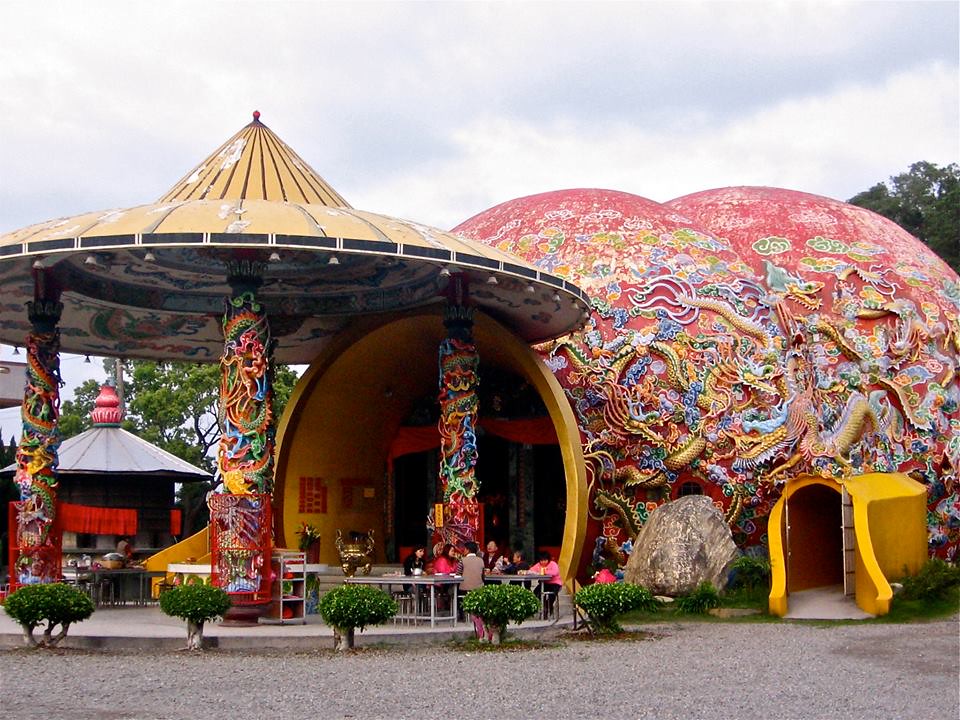 |
| The medicine gourd temple in Caotun (草屯慈德宫) |
The drive from Chihshang (East Rift Valley) to Taidong (the east coast)
This is actually an expat favorite, but still never makes it into those "Top Ten Things In Taipei That I Am Going To Pretend Are Representative of Taiwan" lists. Chihshang itself is lovely, if a bit full of local tourists because some famous commercials and movies were shot there. Nevermind, it's beautiful and worth a stop. It's in the heart of the East Rift Valley - which, gorgeous! - with views of bright green rice fields giving way to dark green mountains on both sides. Check it out, have a coffee at Lavazza - interesting, seeing as the town is famous for Lavazza competitor Mr. Brown's commercials, talk about a missed marketing opportunity - and head up over the eastern mountains to the coast.After a soporific drive through bucolic tropical beauty, with a stop to see some Formosan macaques which may or may not take over your car, you'll be greeted with Hawaii-like views of the sea as you hit the coast at Donghe. Stop for a break at the cafe above Jinzun beach (and absolutely do take the stairs down to the near-deserted beach, though I'm not sure I'd recommend swimming) but otherwise enjoy the Hawaii-Five-O drive down to Taidong. There are a few other places you can stop at on the way, including the expat enclave of Dulan. We didn't stay long, but we did pick up some locally-brewed beer for later.
Hsinchu County
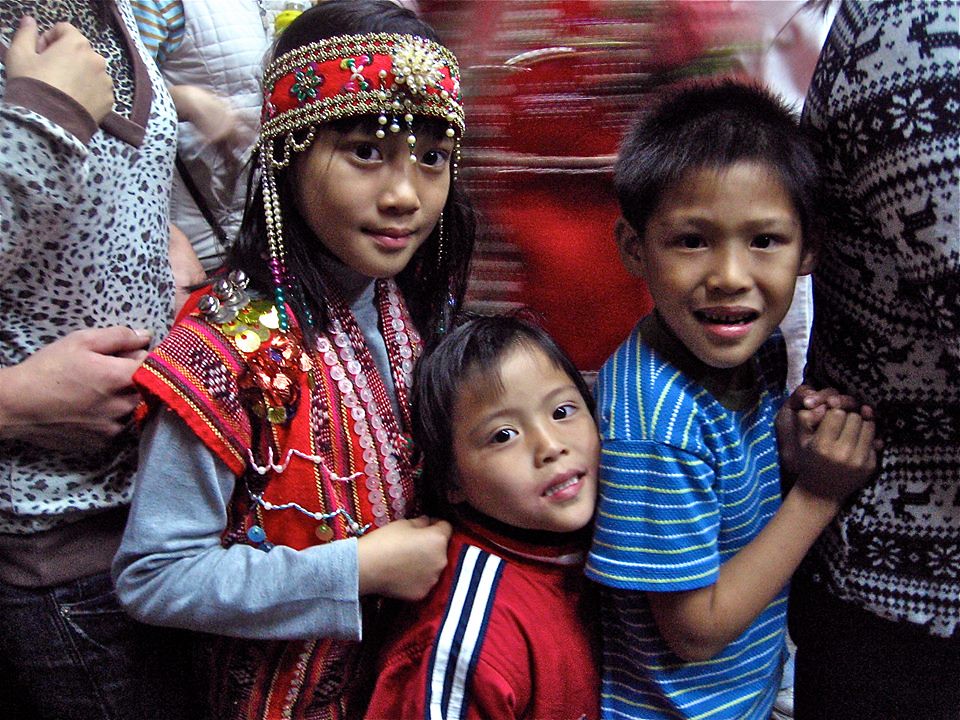 |
| Children at Pasta'ai in Hsinchu county |
I have a lot of links for Hsinchu, so have a look:
Pasta'ai in 2008 and 2010 (including a visit to the house of Zhang Xue-liang 張學良)
Pasta'ai in 2008 and 2010 (including a visit to the house of Zhang Xue-liang 張學良)
Beipu has become something of a tourist stop, but Pasta'ai, if you can finagle the dates for the biennial Saisiyat aboriginal harvest festival, is still a very local thing. As long as you are respectful and friendly and willing to drink a crapton of millet wine, foreign guests are welcome. That said, it's not nearly as commercialized (or really commercialized at all) as its sister festival in Nanzhuang. Don't forget Zhang Xueliang's house and a worthwhile hike over Lion's Head Mountain. The temple on the Miaoli end gets all the press, but I actually liked the old Japanese baroque temple on the mountain itself.
Hukou is, well, an old street. But it's a quiet one, without the same-old-same-old souvenir shops that plague Sanxia, Jinshan, Shenkeng and Daxi. It's pretty far out of town and bus service is sporadic, so you will want to either drive or arrange taxis. Being folks who dislike driving, we did the latter.
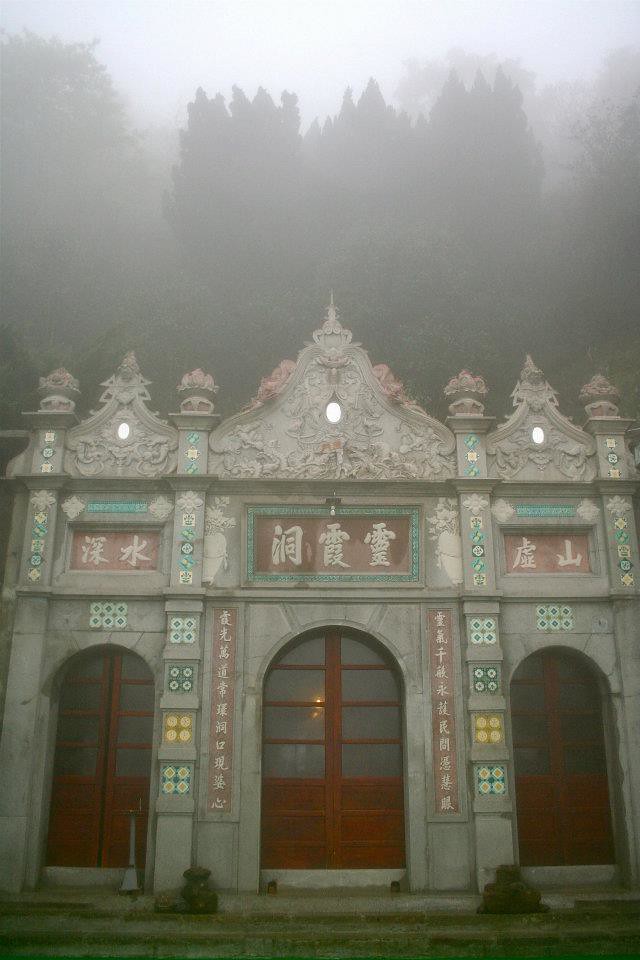 |
| A Japanese-era temple on a creepy, foggy day on Lion's Head Mountain in Hsinchu |
Long and short of it? There's a lot to do in Hsinchu.
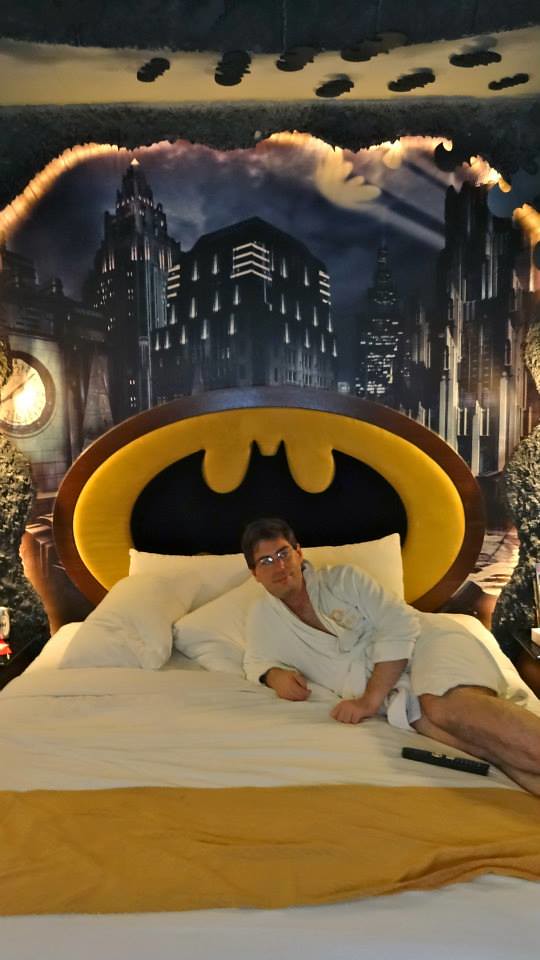 |
| Brendan lookin' sexxxxxxy in the Batman room of a love hotel in Kaohsiung |
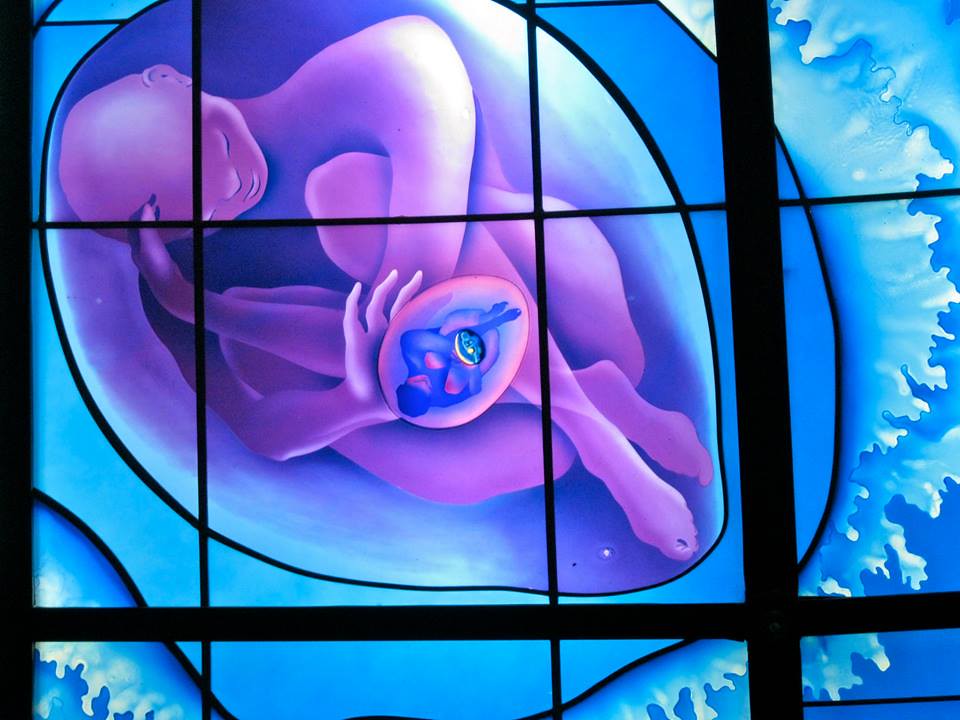 |
| The Dome of Light at Formosa Boulevard station |
That said, enjoy this post about the Batman room at the Eden Exotic Love Hotel in Kaohsiung.
Anyway, I was there for a weekend last month so I'll be fixing that soon. Yes, there are all the things you've heard about: Pier 2, wandering around Hamasen, the British Consulate at Takao (I like to go for the views, that's about it really), Cijin Island, Chaishan and its monkeys, Lotus Lake, Love River, the sugar refinery (which is now a family-friendly tourist spot), Liuhe Night Market. With the exception of the night market, all of this stuff is fine - well, the sugar refinery was a bit bland - and I enjoy it too. By all means, go. Especially Cijin Island, which has great seafood and a fun ferry ride to get you there. I am also a fan of the Dome of Light in Formosa Boulevard station, and in a hallway just off of it, a man who makes sterling silver flower pendants, rings and other charms.
But I like Kaohsiung for its great coffee and food scene, including some fantastic hangouts like Beast (try the sweet potato and cheese quesadillas and Cambridge Cucumber 'mojito'), Reve Coffee and Sojourner Cafe, great burgers at Zzyzx, Takao Beer, a particular cafe on Chaishan that I enjoy, and tons of great local food. I like that it has an MRT so I don't have to taxi everywhere, as I won't rent a car in such a large city. I like Ruifeng Night Market, crowded with locals but almost unknown to tourists. I like hanging out with my friend Sasha in Dashe and eating a whole chicken, gorgeously cooked before walking up Guanyin Mountain.
I'm including Donggang in here because it's a perfect day trip from Kaohsiung. I haven't been to the nearby aquarium, but I can heartily recommend dinner at the harbor (best seafood in Taiwan without going to the outlying islands), Donglong Temple and its magnificent golden gate, a quick walk down the old street, and - again if you can figure out the dates - its King Boat Festival, held every three years, which is worth visiting both at the beginning and the end. Quite possibly the best cultural festival in Taiwan. I wrote my first ever published nonfiction story about it, and you should definitely buy the anthology in which it appears.
Another good choice near Kaohsiung? Meinong. Pretty on-the-tourist-trail, but nice.
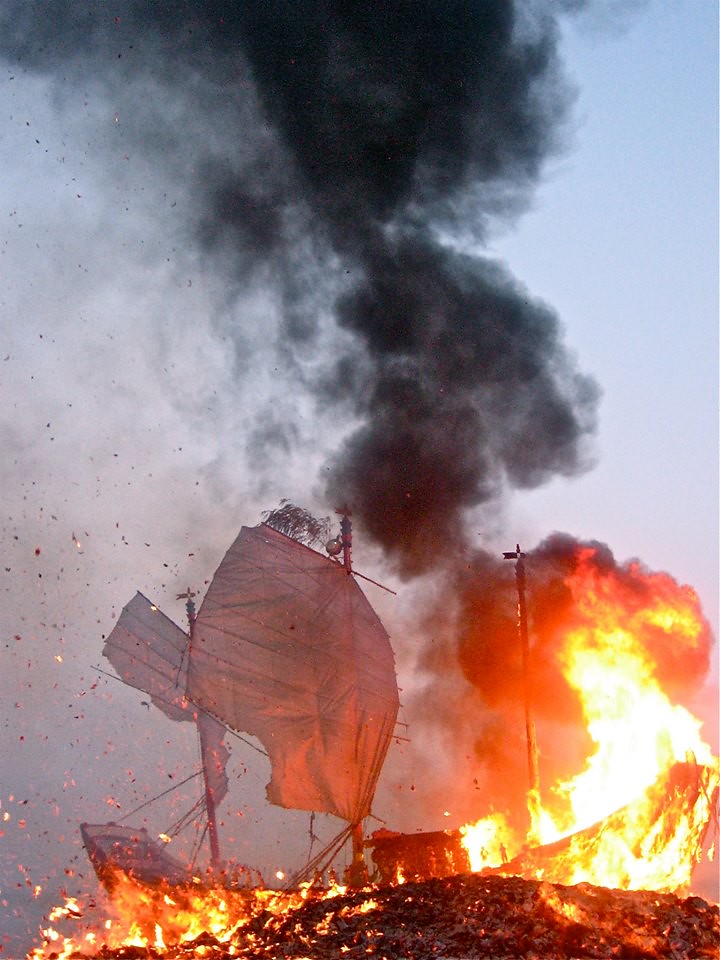 |
| The burning of the King Boat in Donggang |
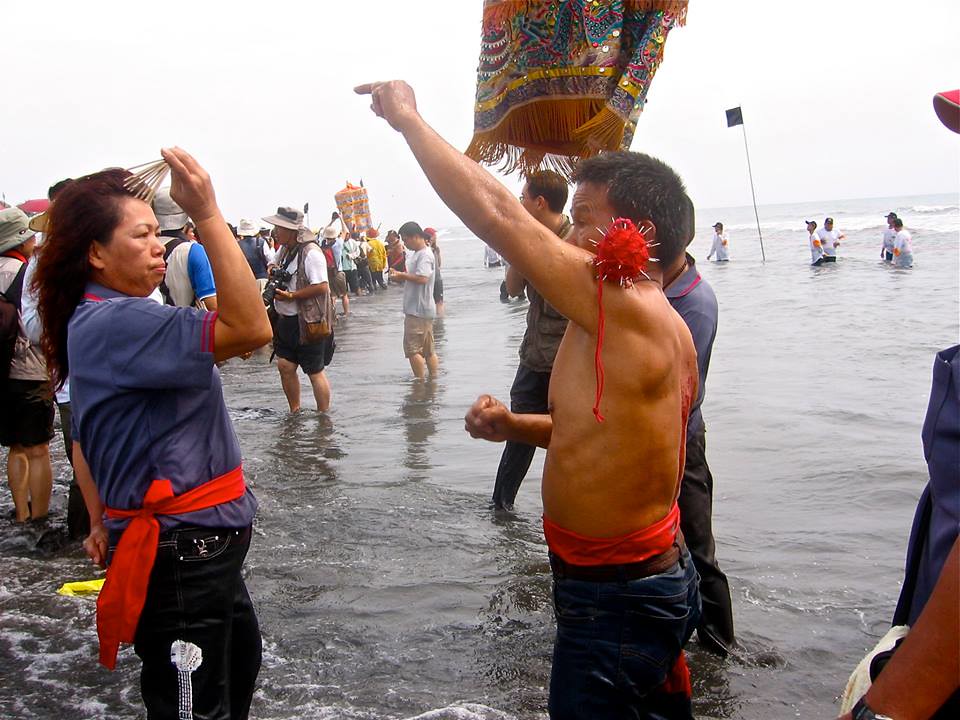 |
| Spirit Mediums in Donggang |
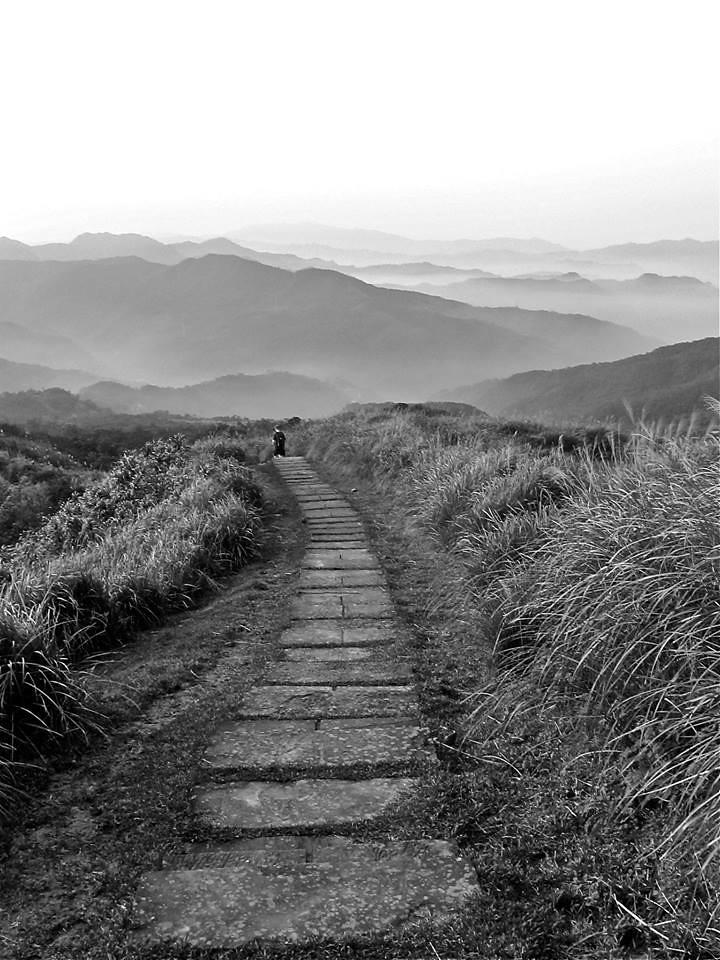 |
| The Taoyuan Grasslands above the Yilan coastline |
There are several hiking trails up here - Yuemeikeng, Caoling Old Trail, Wankengtou and the Taoyuan grasslands (accessible from Caoling Old Trail), and Paoma (Running Horse) Old Trail to name a few. The views? Spectacular. Ever wondered what it was like to walk along a ridge of seaside cliffs with rolling hills to one side and a sheer drop to the waves below at the other? Well, this is it. Probably my biggest "don't miss" set of hiking trails in the entire country.
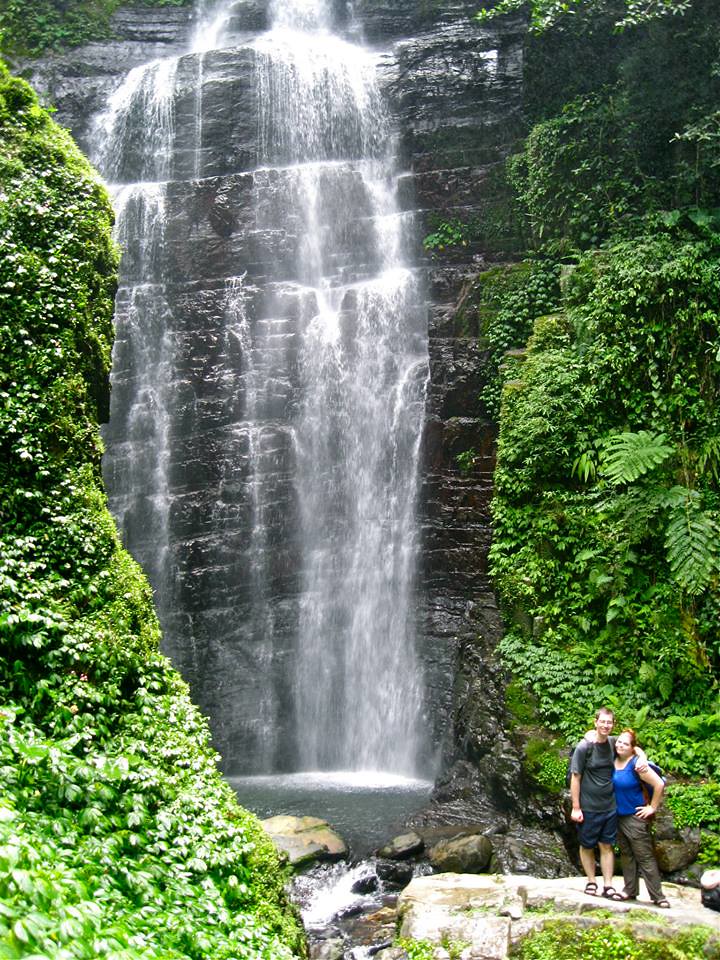 |
| Yuemeikeng waterfall in Yilan - tragically beautiful |
Keelung
No, really, I love hanging out in Keelung. From Heping Island to Miaokou Night Market to the Fairy Cave Temple to Ghost Month, I always enjoy a reason to pass through this - to be honest - kinda grotty town. It's still got the old red light district "welcome sailors!" feeling, it's a bit rough around the edges (okay, at times very rough around the edges) and packed with pachinko parlors, but that's what makes it interesting.
Also, a great stopping-off point from trips to Jiufen and Jinguashi (which are nice, but packed with tourists - for good reason) and my favorite hot springs in Jinshan (in the old Japanese governor-general's hot spring getaway on the coast). Also, a good place to eat after a half day hike up Xiaotzukeng to Jiufen.
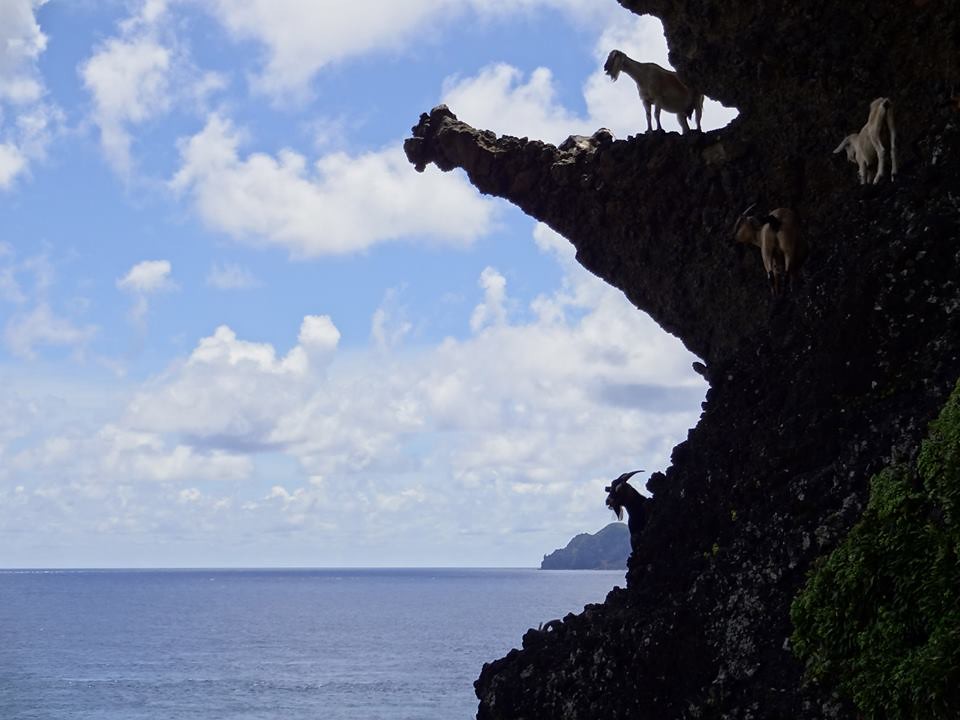 |
| Goats on Orchid Island |
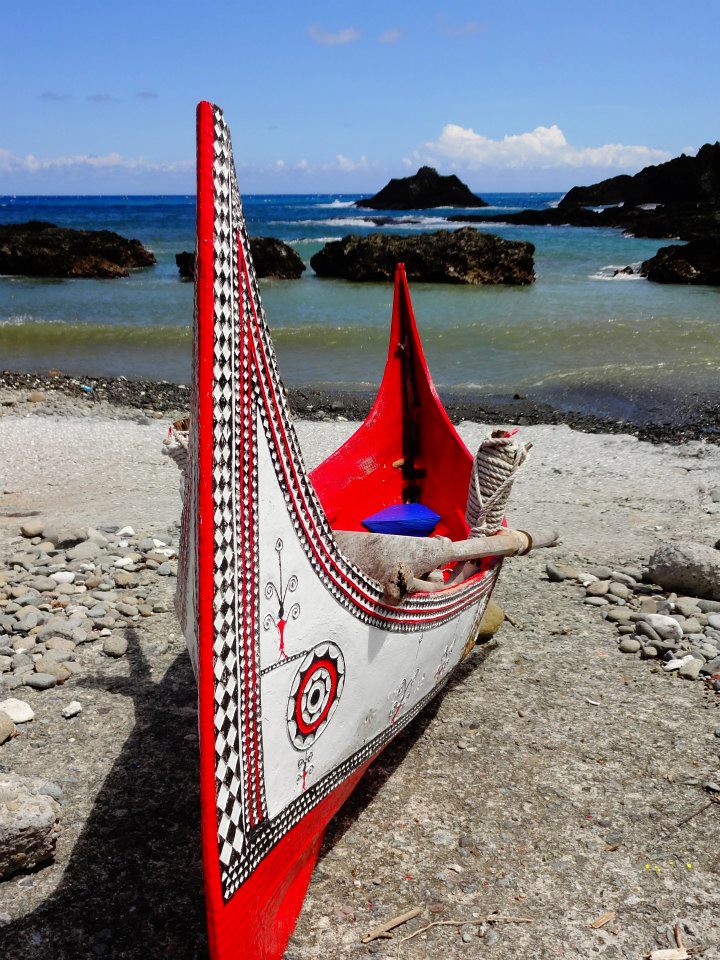 |
| A traditional boat on Orchid Island |
I don't mean to exoticize it that much, I just want to make really clear that Orchid Island is not only nothing like anything you'll find elsewhere, it's also nothing like you'll find in Taiwan proper. It is unique. Don't miss it.
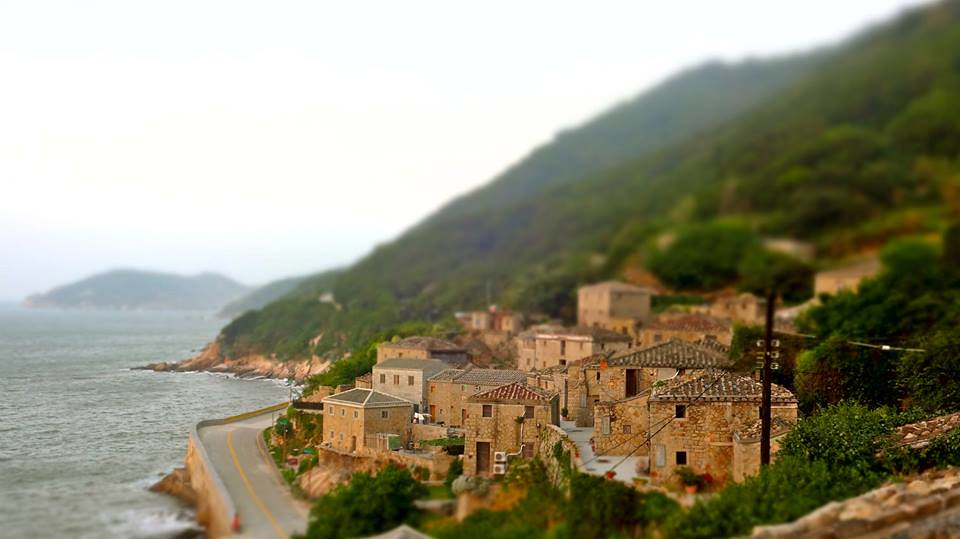 |
| Qinbi, an old stone village, now a nexus of homestay's, on Matsu's northern island of Beigan |
One of my fondest memories of traveling in Taiwan with Brendan was taking off in a car one morning from our homestay on the outskirts of Jincheng with a map that showed the location of every known Wind Lion God statue in Kinmen, and simply driving around to find them (while stopping to enjoy interesting sites we found on the way, which were numerous). Jincheng itself is a wonderful city to wander around, but you don't really get to know Kinmen until you hop in a car and explore its smaller towns, and get a sense of its history - as well as how the major events of history in Asia have shaped it. All the way from the ruined farmhouses, old towns and "foreign mansions" (洋樓) to the Battle of Guningtou to a sad statue of Chiang Kai-shek in a town traffic circle flanked on each side by election posters, at least one for the major opposition party. Mass Murderer, Late Dictator and All-Around Asshat Chiang would be rolling in his grave, and I am happy to know that.
I know I've listed three sets of outlying islands now, and I'd actually like to list Penghu too, but I went in my first year in Taiwan, didn't know much about traveling in Taiwan, and don't remember much either. I'll have to go back, see if I can do a better job of it, and perhaps add it to this list later.
I know I've listed three sets of outlying islands now, and I'd actually like to list Penghu too, but I went in my first year in Taiwan, didn't know much about traveling in Taiwan, and don't remember much either. I'll have to go back, see if I can do a better job of it, and perhaps add it to this list later.
And I know it's a tourist favorite, but I've gotta say I love Lugang. I really do.
I love the old Ding family home (丁家老宅) with its coffee shop in a side hall. I love the old buildings on Zhongshan Road. I love the old street and its cafes in restored houses. I love the festivals at the Matsu temple. I love the old Longshan Temple at the other end of town. I love fried oysters. Hate me if you must, but I love Lugang and I am not afraid to admit it.
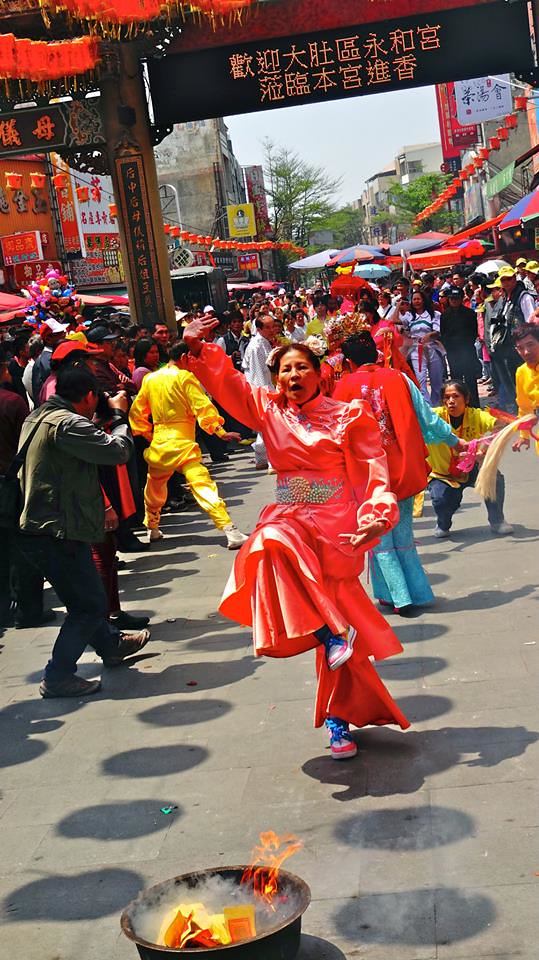 |
| A woman becomes a spirit medium in Lugang |
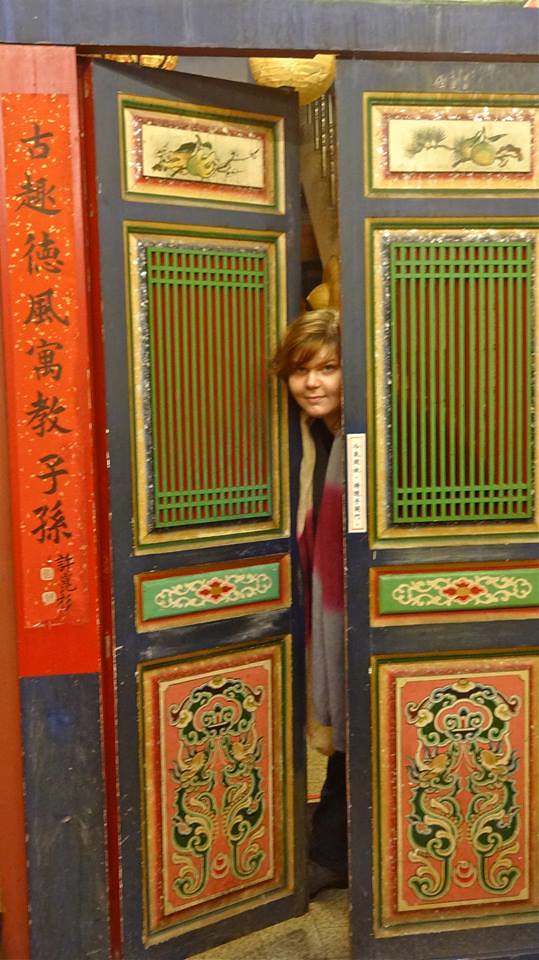 |
| At a cafe in Lugang |
Subscribe to:
Posts (Atom)
